#and either the upholders of the law or straight up villains there is no in between
Explore tagged Tumblr posts
Text
No I don’t have a type wdym—
it’s the white hair damn it










#why is it always the white haired men#and either the upholders of the law or straight up villains there is no in between#jujitsu kaisen#jjk#gojo satoru#genshin impact#neuvillette#honkai star rail#jing yuan#demon slayer#kny#douma#my hero academia#bnha#Dabi#inuyasha#cyno#tengen uzui#hell’s paradise#gabimaru#sesshomaru
250 notes
·
View notes
Text
Hard Evidence
“I already told you,” said the detective’s father. “It’s a double suicide.”
“And I already told you,” retorted the detective, “that that’s bullshit.”
Historically, this was the point in time where the detective’s father—high up the NYPD’s chain, and with the gal and arrogance to show for it—would pinch the bridge of his nose in frustration, look his so-called recalcitrant son in the eye, and proceed to launch into a tirade as to how the detective should be more respectful of a veteran’s word. Also the point in time where the detective would set his chin straight, lock his jaw, and weather each and every effort to deter him. In other words: I’m not backing down today.
Or any other day.
At long last, his father, visibly struggling to rein in his oncoming temper: “I don’t get how you’re so obsessed with a cold case.”
“I don’t get how you’re so willing to sweep a mass murder under the rug.”
“The coroner ruled it a double suicide.”
“The coroner is wrong. And so are you, for letting an entire family not get justice.”
His father arched an eyebrow, at that. “I’m sorry—you do happen to know that it’s [villain]’s family we’re talking about? You didn’t get your records confused or anything?”
It was then that the detective had to clench his teeth on the choice words he would have liked to fire his father’s way. “Yes,” he bit out. “And that’s exactly why I’m concerned everyone’s eager to forget this ever happened. Because it’s [villain]’s family.”
“That’s exactly what you shouldn’t be accusing me of, of all people.” And yet his father’s retort was beginning to sound halfhearted. Either he didn’t want to humor his son’s “far-fetched reaches”—or, as the detective had been suspecting all along, the hatred for the villain ran so deep it distorted his father’s vision. Perhaps to the point that his father would . . . would . . .
“I’m really struggling with this, Dad.” A trace amount of despair hollowed the detective’s voice, despite himself. “My entire life, I wanted to be just like you. To go into criminology, to get licensed, to solve cases and offer grief-stricken families the peace they deserve—”
“And you’ve been doing fantastically,” his father put in.
“—and to apprehend the depraved people who could bring themselves to do something as cold as murder. And I don’t care who they do it to. I don’t care if it’s the royal family, or if it’s [villain]’s family. All I care about is upholding the law. Upholding justice.”
Now his father’s expression was clouding over—with anger or wariness, the detective couldn’t tell. Maybe it was a mix of both. Maybe the detective had said too much. Silently he cursed himself for, not for the first time, falling victim to the force of his irrepressible emotions.
A moment of silence. Two. Then his father said, “I’ll tell you.”
Hope ignited in the detective’s chest. “Really?”
A slow nod. “But,” his father added, “I hope you know this is sensitive information, the likes of which I’m not supposed to divulge until you’re a true practitioner. I was sworn not to d—”
“You can stop there. I wouldn’t betray your trust. I’d just like to know make peace with all this . . . that’s all.”
And so his father told him. From the moment they’d located the villain’s place, to the moment they’d borne witness to the villain’s parents, streaked crimson and with glassy eyes fixed unseeing on the ceiling. His father explained how it was most likely a double suicide—after the villain’s parents had been located, he said, they’d realized there was nothing for them beyond jail bars. They’d decided to take agency of their ending. As for the villain themselves?
“We don’t know their whereabouts yet,” his father answered him. “But rest assured, a dozen task forces are hard at work searching every nook and cranny for them.”
A good few drinks later, his father had gone into every grotesque detail he could. The autopsy reports, the blood samples, various blueprints of the villain’s residence. All the reasons why a murder was unlikely. Then, when his face had colored and he was slurring his syllables, the detective’s father bid him goodnight and exited the living room.
The detective pulled out his phone, and hit pause on the record button.
“Done,” he said. “Everything we need should be recorded here.”
“So the city’s very own golden boy can break the rules every now and then.” As though made of thin air and shadow, the villain materialized next to him, all lopsided smirk and piercing, shrewd eyes. “You never cease to surprise me.”
“I told you.” The detective pocketed his phone. He would pore over the recording later. “I’m leaving no stone unturned in finding out who killed your parents. And my father wouldn’t have told me much unless I pressured him.”
“Because you want to bring them justice?” The villain was helping themselves to a stiff drink of their own. A momentary pause, then:
“Or is it because you believe me? Believe that your precious dad is the one who murdered them both?”
A shiver iced the detective’s spine. He tried to maintain composure.
“I only believe hard evidence,” was his response. Thank God for the numbness alcohol wrought.
“I’m sure there’s a lot of that going around,” the villain said.
The detective hummed his noncommittal agreement, doused his thoughts with another shot. A lot of that going around indeed.
#cw: mentions of suicide#detective x villain#villain x hero#hero x villain#heroes and villains#villains and heroes#murder mystery#ficlet#writeblr#my writing#dialogue#creative writing#flash fiction#teamup#mine
121 notes
·
View notes
Text
Tangled Salt Marathon - Max and Eugene in Peril on the High Seas
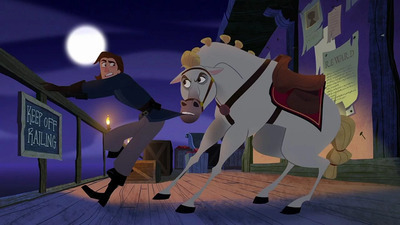
So we have another obligatory animal focused episode. This one fairs much better than Max’s Enemy and King Pascal; but it’s still ultimately useless filler.
Summary: Rapunzel and the group are finally leaving Tirapai Island when the cargo ferry arrives, but Eugene and Maximus get into an argument, resulting in them falling overboard. They manage to save themselves on a passing ship, but discover it to be a prison ship where all the criminals, including the Stabbington Brothers, Lady Caine and Axel have escaped and taken control. Eugene and Maximus attempt to escape, but discover the villains' plot to ambush the cargo ferry and set out to stop them. Meanwhile, Rapunzel and the group discover Eugene and Maximus are missing and set out to rescue them.
There’s No Ticking Clock In Season Two and That’s to the Series’s Detriment
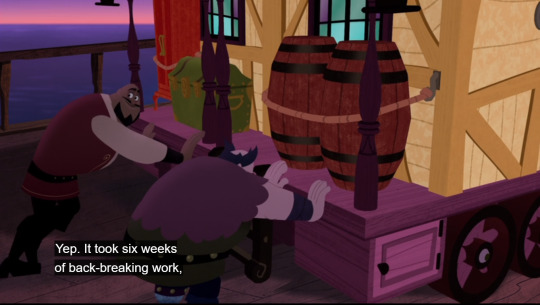
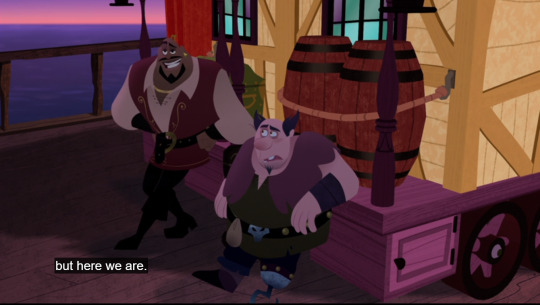
So we’re finally leaving the island and this bit of dialogue tells us that they were on said island for at least six weeks. Which matters not in the slightest in the grand scheme of things; which is the problem.
In addition to there being no outside threat forcing Rapunzel on this journey, there’s also nothing that’s forcing her to hurry up. So we’re doubly lacking in tension. There are no stakes in season two so things feel over long, and arcs that have the heroes stay in one place for more than two episodes at time stop the momentum of the series dead; leading to tedium for the viewers.
We Didn’t Need King Pascal Just to Set Up the Firefly
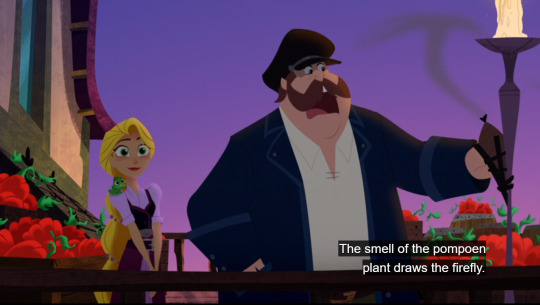
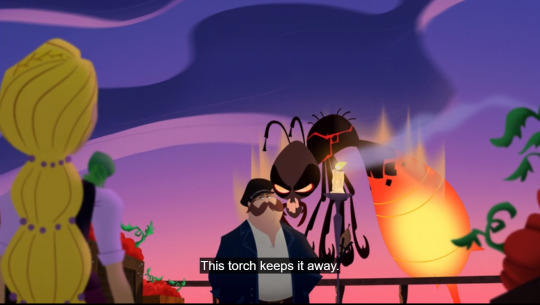
The firefly is one of the few elements in the show that has proper set up and resolve. It’s established as the threat in one episode and then used as the solution in this episode. However both episodes are utterly useless in the over all arc so, while clever, it’s a wasted idea. It’s also unneeded since this intro exposition re-explains what the firefly is and what it’s deal is in case people missed out on King Pascal anyways.
The Reason Why this Max Focus Episode Works, but Not Max’s Enemy, is Because It’s a Double Act
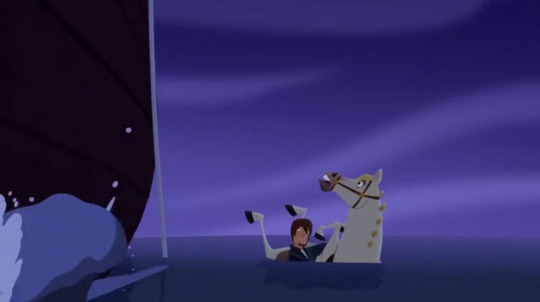
The problem with the mandated animal themed episodes every season is that Max and Pascal aren’t strong enough characters to work by themselves. They’re sidekicks; they’re designed to play off other characters. The writers seemed to clue in on this by making this episode and Max’s episode in season three, team up episodes. So now today’s episode becomes a Eugene focused episode too. Which in turn allows for their character dynamic to be fleshed out more.
We needed more interesting combinations of the mains in episodes like this one in order for the group to feel like a group. We also desperately needed to do something similar for Pascal instead of just rehashing the same plot for him over and over again.
This Plot Point Makes No Sense
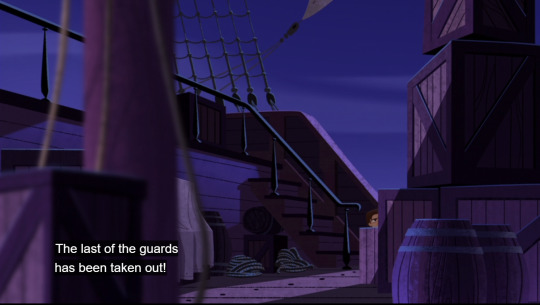
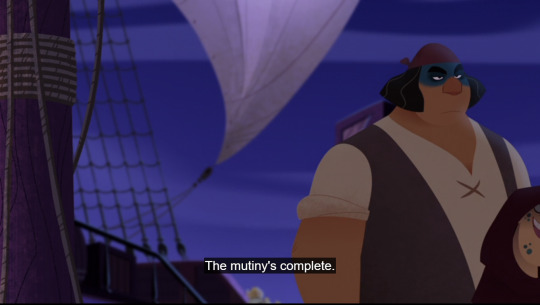
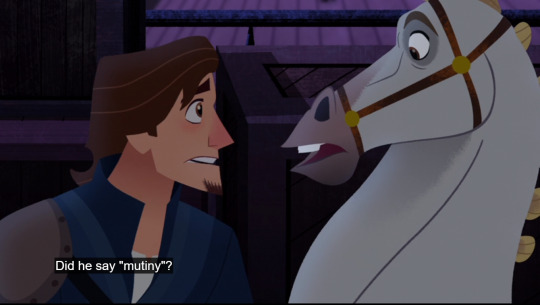
When I first saw this episode, I thought it was foreshadowing later developments for season three, seeing how it’s one of the few episodes in season two that connects back to season one. However, once you know the events of season three, this episode no longer makes logical sense within the greater narrative.
For you see, Andrew and Varian have teamed up to take over Corona at the beginning of season three. Yet that begs the question of why didn’t Frederic ship them away on the prison barge as well. Varian you might could excuse being missing here given his age, but Andrew? There’s no reason to keep Andrew around; none that is given on screen anyways.
Also this mutiny couldn’t have taken place after the Saporian take over either. For starters all the guards retreated from Corona entirely when it became evident that the Saporians were in charge. That’s a stated plot point in Rapunzel’s Return to explain why Cap is missing. There wouldn’t have been a need for a mutiny if Andrew just let all the criminals go and there’d be no reason why Andrew would send them away using his own guards. The Saporians are small in numbers and that would be a waste of manpower.
Also, because the Saporians are outnumbered, it doesn’t make sense to send away potential allies. Lady Caine has more logical motivation to join Andrew in his take over than Varian does. She just wants revenge on Frederic and riches. She cares nothing about ruling a kingdom and holds no qualms about hurting others; so she’d be the perfect partner for Andrew’s plans. Add in the fact that she has a whole gang/small army of criminals under her command, and she could have brought along some much needed manpower.
Lady Caine is Wasted!!!
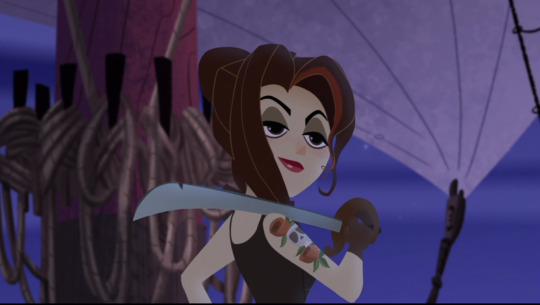
Speaking of Lady Caine, this is her final appearance in the show. Introduced in the pilot as an important character, yet given only three episodes and shoved out of the picture before the final season. And they didn’t even bother to bring up her original motivations or goals in any of her return appearances.
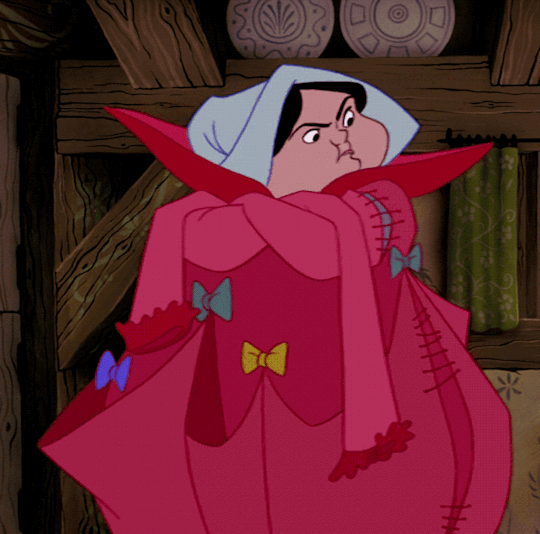
Chris mentioned in interviews about how he wanted to ‘defy audience perception’ and so pulled a bunch of bait and switches in the writing; but this isn’t that. This is just straight up lazy writing. There’s nothing clever about introducing a character as being important and then not using them. It’s a frustrating waste of time and a waste of a concept; not a surprising ‘gotcha’ for the audience.
Proper set up and resolve exists in storytelling in order to get your audience invested in what is happening and then give them a satisfying pay out for their continued involvement. Modern television writers have gotten so caught up in ‘shocking’ twists that they forgot the importance of giving satisfying endings to their audience. Because if the audience isn’t satisfied they will walk away. Hooks alone are not enough to keep them around as evidenced by the series ratings drop.
Also, Why is Weasel Here?
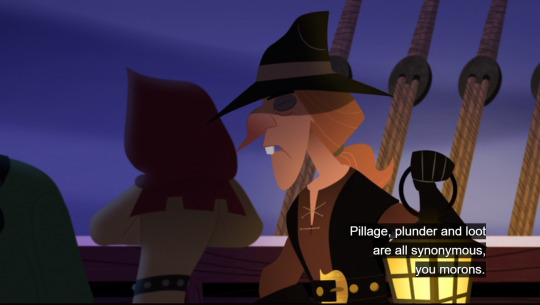
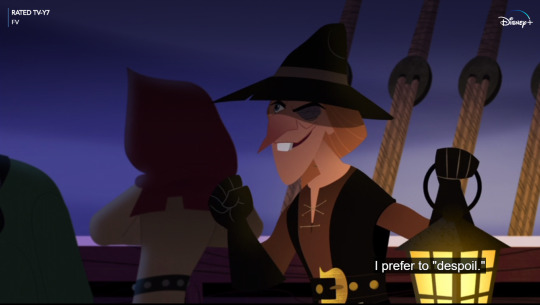
I once suggested that this episode would make more sense if Max’s Enemy came before One Angry Princess in season one. Implying that Caine and the gang were sent away before Andrew’s arrest. This idea flies out the window with Anthony the Weasel here. He was last seen running away at the end of The Return of Quaid. How the hell did he wind up here?
He had to have been arrested, put on trial, and then shipped away with the other criminals in between TRoQ and PotHS. Which just raises a whole bunch of other questions.
How much time has passed between then and now?
What did Weasel do to get caught in Corona?
Why did it take so long to ship Caine and her gang out when it was just a matter of days for Attila to be banished?
Why wasn’t she put on that same barge Attila was going to be put on?
If there was enough time to ship Attila and the Weasel out then there was plenty of time to ship Andrew and Varian, so why are they still in Corona?
Why is there even a prison barge to begin with? Are they just that stripped for room and man power in Corona’s dungeons?
Where does the prison barge actually go to? Does Corona own a prison island or do they have a deal with another kingdom? What is the world building behind this plot point?
Also where the heck did Dwayne go?
You Need Villains
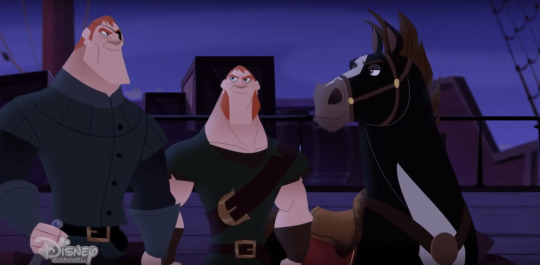
In the end it doesn’t matter. This is just a lame excuse to get rid of all of the season one villians besides the Stabbingtons. Which only stick around because they’re movie originals and need to reappear and be redeemed before the wedding short; otherwise they’d be gone too.
Which is the dumbest idea ever! Season two and even the first half of season three is devoid of any main antagonists so why are we getting rid of anyone who could potentially fulfill that role? Who’s stupid idea was this? What were they smoking? This goes against basic writing 101. There’s no story if there’s no conflict!
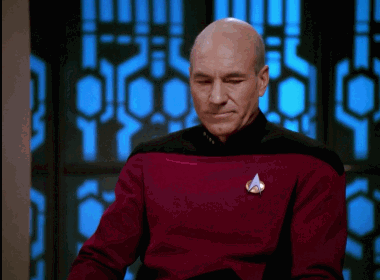
Eugene Has a Point
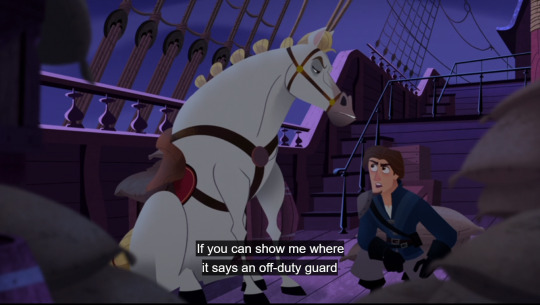
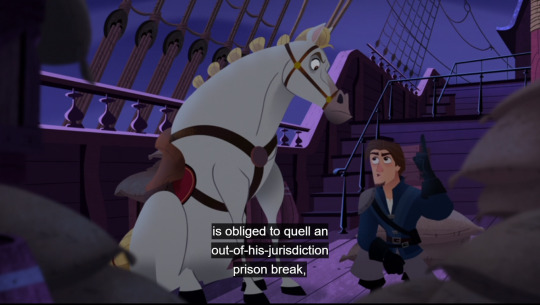
Like there are reasons why law enforcement aren’t on call 24/7 and there are also reasons why different territories have different jurisdictions. Not complying to that undermines law and order, not upholds it.
If a police officer from the US could arrest people while on vacation in Spain, it’d be a political nightmare. Even extrication of wanted criminals who seek refuge in other countries requires permission and cooperation from those countries governments or you’d be violating international law; which potentially could be seen as an act of war.
Also you would still send in people who are actually on duty. Right now there are protests in my country regarding the lack of accountability police officers have. Plenty of cops break the law both on and off duty because they know they can get away with because of the nepotism within the force. Max pulling out a guide book that essentially gives Corona’s guards permission to ‘enact justice as they see fit’ while even off duty is clear case of an abuse of power, and futhers the narrative that Corona is a dictatorship/police state that persecutes it’s most vulnerable citizens.
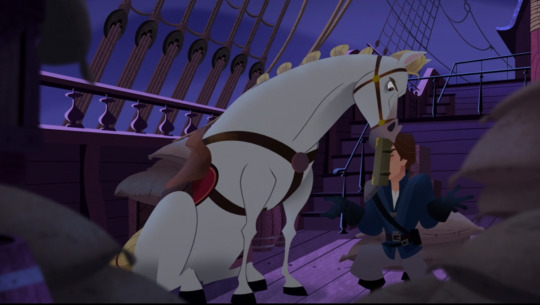
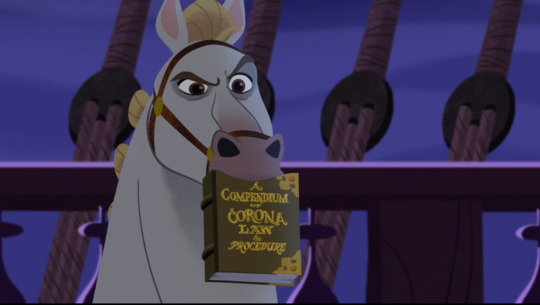
The fact that the narrative then rewards this line of thought by placing Max in the right on this is just another check off in the long list of promoting authoritarian beliefs that this series teaches. People with power are held to different standards then those without. That’s just a fact of life. Having Eugene or Max acknowledge that this does break the law but is still right thing to do would be far better message and give the characters more complexity.
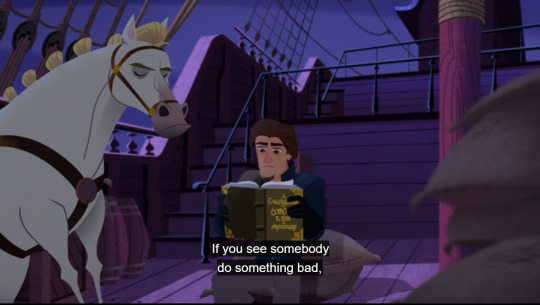
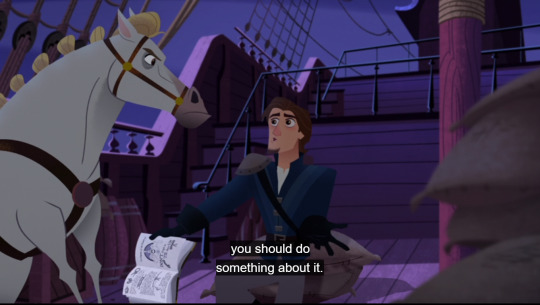
Who gets to decide what is ‘bad’ here? What is this ‘something’ they are meant to do? This rule is a gateway for corruption because it’s not clearly defined and relies too heavily on the idea that guards are naturally ‘honorable’ and good and not, you know, people.
There’s a saying in law school. Nothing is simple and fair. If it’s simple then it’s not fair; and if it's fair then its not simple.
Laws are complex because life is complex, people are complex, and not everything applies the same way because situations are different. That’s why we have courts. And yes, sometimes there’s too much discrepancy in sentences, leading to some people being harshly over punished while others get away with little more than a slap on the hand; but having things the other way around would still cause such discrepancy as not everyone���s experiences are equal to begin with.
And before you say I’m reading too much into a kids show, this is a conflict that the episode itself has decided to introduce. If you wanted a simple message about doing the right thing than ‘the law’ should not have been brought up at all. Because laws are not simple, they are not universal, and they are not infallible. If the writers thought this idea too complex for their audience then they shouldn’t have introduced the idea.
It's better to not bring up deeper subject matter at all than to introduce it and then not address it properly.
Oh, and We Get Confirmation that Corona Speaks English, for Some Reason...
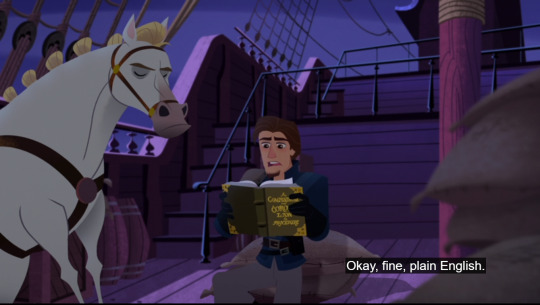
This was also hinted at this in the supplement book, My First Year As A Princess; which was suppose to replica of Rapunzel’s Diary in the show, though it’s sverealy been paired down from the original concept.
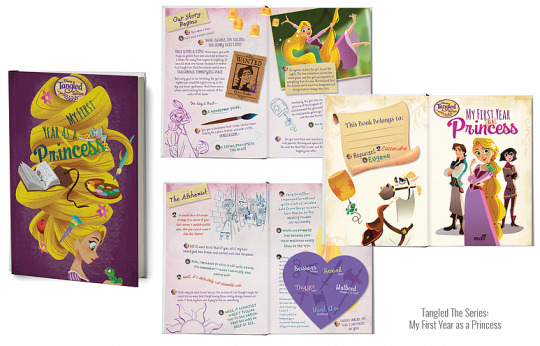
Anyways, it’s pretty much canon that everyone is indeed speaking English on screen, even though there’s no logical reason for this. Chalk it up to yet more lazy world building.
Corona is never hinted to being a replacement for England itself. The few hints we get to it’s placement on the world map suggests it’s on the main continent of Europe and is a peninsula. Other real world languages like, French, Italian, and German are confirmed to exist, with Italy at least being a real location in this world.
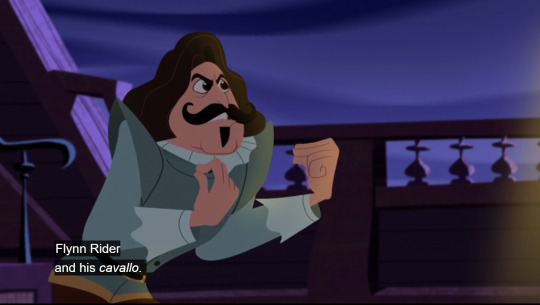
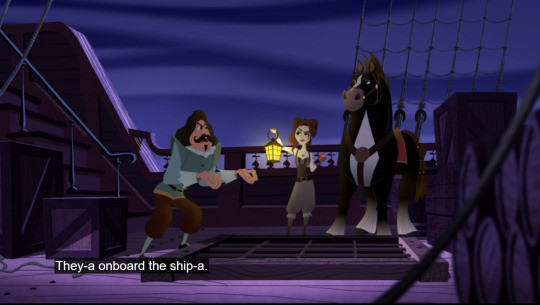
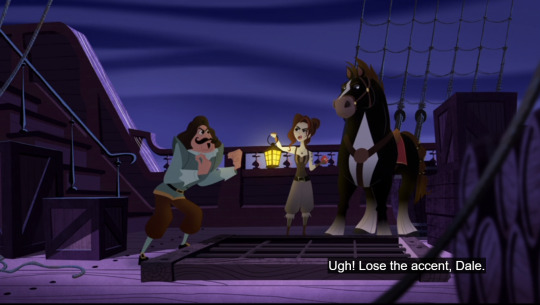
Also we spend this whole season traveling to other kingdoms. So why would everyone speak English? This is before British and American imperialism, and before the internet, so English wouldn’t be a default secondary language for the many countries that it is today. So how does this work?
Once again, if traveling the world is a big plot point of your story then you need to determinate where and how your main protagonist fits into that world. If they’re a princess of a kingdom then we need to know where that kingdom is in relation to the surrounding places we visit or discuss.
Axel is Still Useless
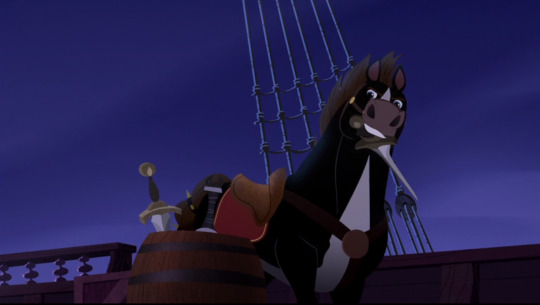
Max didn’t need a rival. This character adds nothing to the over all story and is one villain/character too many in an already overstuffed series. I don’t mind the idea of pairing down some of the minions and other background characters. I just take issue with getting rid of all of the villains. Particularly interesting ones that could have done more, like Weasel or Lady Caine.
The Very Existence of Lady Caine Undermines Both Rapunzel’s and Cassandra’s Arcs
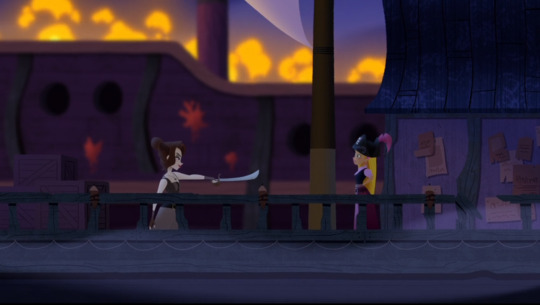
So the series wants to present this idea that Rapunzel is compassionate and is all about giving second chances, yet Caine, one of the most sympathetic villains in the show next to Varian, is given zero chance at all. The show is too busy trying to make Rapunzel look ‘bad ass’ by easily taking down an seemingly equal badass female villain, that doesn’t stop to think about the implications of this conflict.
The series fails because the only people Rapunzel redeems are people that she needs something from. She needs Styalan to gain the Eye of Pincosta. She needs Varian to help defeat the Saporians and ease her bruised ego. She needs Cassandra because she’s her best friend and it hurts her personally for them to no longer be friends. None of the redemptions in the show are actually about the characters who are redeeming themselves, it’s about their effect on Rapunzel’s personal life.
But placing Rapunzel’s personal feelings above what other characters actually need is the opposite of compassion. It’s selfishness. It doesn’t make Rapunzel the focus of the story it just makes her look like an ass.
Moreover Lady Caine’s arc is directly tied to Corona’s corrupt legal system. Rapunzel can’t be this purveyor of change if she and the show never acknowledges why the system must change to begin with.
Last off, Cassandra’s arc is then diminished by the existence of more sympathetic villains like Caine and Varian. They have more reason to do the things they do, and their actions connect back to their goals. Cass doing worst things for less reason, and then getting away with less punishment than them, is a slap in the face to the viewers. It turns her from a likeable character to an unbearable twat, and makes her later redemption a product of nepotism rather than act of agency on her part.
Everyone is ill served by writing Caine out and not giving her a conclusion to her personal conflict. Rapunzel, Cassandra, Frederic, and Lady Caine herself are all denied a chance to grow as characters and that’s infuriating to watch.
Also Yes, This Episode was a Big Missed Opportunity to Add Urgency to the Plot
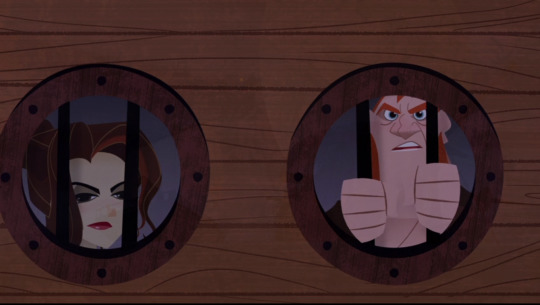
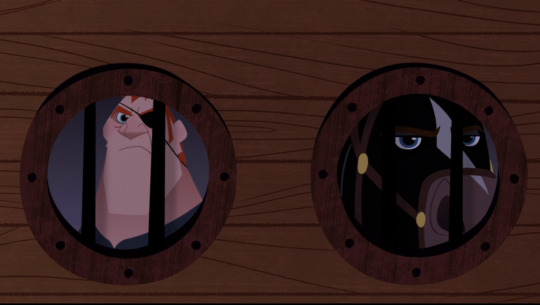
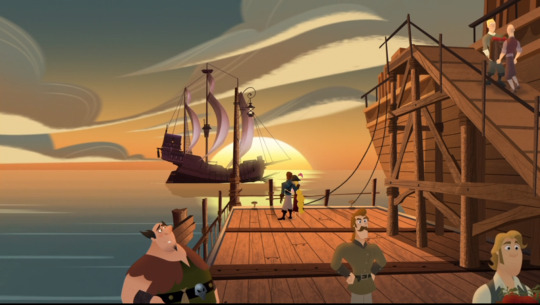
As previously mentioned, season two needed an ongoing external conflict. Anyone of the villains on the ship could have been the main antagonist of the second half of the season. Just have the person in question escape in the confusion, or overthrow the new crew of the ship a second time. Then have them show up later looking for a fight.
My money is on Lady Caine, but the Stabbingtons or Weasel could have done just a well. Caine wants revenge on Rapunzel. The Stabbingtons are after Eugene. Weasel wants power and riches, so capturing the princess and holding her for ransom could have been a goal. Then have them learn about this hidden power then voila you gotta a set up for a race to the end of the quest.
You also could just picked an underling at random and then elevated them to main villain by giving them a good goal and a backstory.
Also finally, Andrew and/or Varian, we’re options that they could have added in here. Varian more so than anybody else as he already has reason to go after the moonstone because his father.
Heck, you still could have added Varian and not made him the villain if you didn’t want to. This could have been the start of his redemption arc instead, and one of the previously mentioned villains,a Brotherhood member, or one of Zhan Tiri’s Disciples could have still served as the main antagonist.
In short, most of the problems with Tangled’s story are really easy fixes and the writers had multiple options at their disposal that they didn’t take. Which is just further evidence to last minute rewrites and Chris and Ben’s missamangment.
Conclusion
I enjoy this episode because it’s one of the few to tie back into season one, but it’s is a missed opportunity and it is a shame that it went nowhere.
#tangled#anti-tangled#lady caine#anti rapunzel#anti cassandra#eugene#max#tangled the series#rapunzel's tangled adventure
68 notes
·
View notes
Text
Episode 15! And you won’t believe this, a white person showed up!
I started watching the episode after I answered this last ask, which itself made me think about 19. The thing about 19 is that it neither praises nor condemns white people, because they simply don’t really exist in Aisha’s world. (That’s not true for every 17-verse season though, I know for instance Abdi had a white gf.) When white people show up on 19, they’re that guy that checks tickets at the bus, or a customer at the smoothie shop. They’re the nameless law students Aisha sees when she has to make Yusuf believe she’s already attending uni. They’re the people in the judicial system that Emrah sometimes talks about (lawyers, judges, etc).
All this to say, I was surprised when this white woman showed up and had several lines lol.
So Aisha arranged a meeting with a woman around her same age who can tutor her in maths. But she probably arranged said meeting when she didn’t have more pressing concerns, like getting Emrah to agree to have dinner with her brother and herself. As such, Aisha’s not really paying attention to the lecture. And though I tried to follow the lecture myself, I also wanted to figure out exactly what Aisha was texting Emrah, without using google translate. So yeah, things are not looking great for that math test.
On that note, I’ve been wondering for a while what event the episodes are counting down to, and I’m thinking it might be Aisha’s actual math exam. It’s either that or something to do with Emrah’s international drug deal. But I hope it’s something that impacts Aisha directly.
Anyway, I think Aisha left her cellphone at home intentionally, because when she walks up to Khushi’s (not a pal, but an actual Indian restaurant in Oslo), she hides between two cars to check the time on her laptop! It’s already 6:07 pm and Emrah is nowhere to be seen. However, Yusuf is at the entrance, pacing the sidewalk.
(Edit from the future to say that three different people sent me asks to remind me that Aisha’s mom confiscated her phone after their fight. So, including me, there are at least four people watching the season in real time! A veritable crowd!!)
Time to face the music, so Aisha walks up to Yusuf. Yusuf wants to know where Aisha’s boyfriend is. Aisha says she doesn’t know and doesn’t have her cellphone. Yusuf says to use his cellphone. Aisha says she doesn’t know Emrah’s cellphone, Yusuf says to look it up... Anyway. For a second, it looks like Aisha might come clean and say she broke up with Emrah, but instead she says he must’ve gotten tied up at work. Gvhvhv please Aisha, we have 4 episodes to go, when are you going to stop lying? 😂
Luckily, Emrah jogs up right at that moment and backs Aisha up, with a story about how there was some trouble at work. Aisha introduces the boys, Emrah extends his hand, and after a moment of playing tough, Yusuf shakes his hand.
While at the restaurant, a server comes up wanting to know what they’ll be drinking, and Yusuf’s like “tap water, now gtfo.” They have some SERIOUS shit to be talking about here, server! Indeed, Yusuf cuts straight to the chase and says he knows about Emrah’s history. He says his sister is the most important thing in the world to him, even over his parents, and Aisha isn’t allowed to see Emrah. HOWEVER, he’ll now be going to the bathroom, and when he comes back, he wants to know what Emrah has to say for himself.
I’m going to take a break here to talk briefly about Wtfck, a show where another Moroccan girl has an overprotective older brother. My thing about Yusuf as compared to Elias Ait Omar, is that we’ve been shown over and over again where Yusuf is coming from. We’ve been shown that Yusuf is himself pressured by his environment to check on his sister, have opinions on what she wears, on who she hangs out with and who she dates and who she makes out with in public. We’ve also been shown that, otherwise, Yusuf loves his sister and is genuinely proud of her, that he as an older brother loves to tease her and fuck with her, that he isn’t all disapproval all the time. I know that when Yusuf says that men and women are different, he’s saying that because he can see that his environment treats men and women different, and he doesn’t know or hasn’t questioned or thinks he can’t fight why this is, NOT because left to his own devices, he’d uphold this system he and Aisha are part of. Elias has simply not gotten the same treatment. I understand when people say that Elias isn’t a villain, and that Muslim siblings have this kind of conversations all the time. But do the wtfck writers know that boys like Elias are subject to pressure themselves? Or do they think Elias is a willing oppressor? Because it’s very clear that the 17-verse writers know Yusuf is only trying to play by the rules as he understands them.
While Yusuf is taking a leak, Aisha begs Emrah to make up a story, say he’s done with that life, just anything that won’t get Aisha in trouble with her parents. Emrah’s like, “I’m done lying.” That makes one out of the two of you, man. Meanwhile, the server comes with a jar of water and tries to pour it in each of their glasses. Aisha’s like, “Excuse me, I got this! Can you gtfo I’m having an important conversation here!” Lol this poor server.
Yusuf then comes back, and Emrah’s actor is given the chance to deliver on the best monologue I’ve seen so far on the show. He made a mistake, he did time for it. He’s trying to get his life back on track, thinks he might study to become a teacher. He would like to help teens in the situation he was, teens from bad environments who could be led to make the wrong decision and ruin their lives. Which isn’t to say he blames someone else for his choices. He made the choice to get involved in drug dealing himself, it was all him, not anyone else’s fault. But no, he’s not done with that world because he still owes money to Bigmac and has to pay it back.
Yusuf’s like, “Alright, that’s enough. I don’t want you to see my sister again.” Emrah says he respects that decision, and puts on his hat and coat to leave. Aisha begs Yusuf to let Emrah explain. This is pretty funny because she never let Emrah explain to her lol.
But Yusuf agrees to listen, and Emrah adds that, because of his decision, he lost everything. His future, the person he loves... But most importantly, he lost his little brother, because as Emrah was sitting in jail, Ibo, just 16, was out in the world all alone. He finally says that when he first got a handful of bills, he felt like a king. But in reality, he was just a loser with good clothes.
The mention of Emrah’s little brother goes straight to Yusuf’s heart, an older brother himself. He once again reiterates Aisha is the most important person in the world to him, and he wants to know how he can trust that Emrah truly just wants to be done with drugs forever. Emrah says that’s up to him.
This is such a good scene. It really became about Emrah and Yusuf, connecting both as older brothers and men in an environment where things and decisions don’t necessarily come easy. It reminds me of Markus’ season in the sense that I don’t agree with these men’s every decision, but I understand how they got here and understand they’re subject to different pressures than myself. It does make me believe that if you approach someone in good faith and make an effort to understand them, a better world is possible. Which is also what I felt when I first watched Isak’s season.
Indeed, when all three are done with dinner, Yusuf says he’s going to catch up with a buddy and sort of tells Aisha she’s free to go home by herself (remember that the only reason Aisha was allowed out was because Yusuf was going to tag along). Pretty much letting Emrah and Aisha walk home together and have a moment to themselves. Aisha feels that everything is coming up Aisha! But Emrah says that they’re done. Aisha says no, she wants to help him. But Emrah says this is his mess to clean up, and now that he made things good with Yusuf (and by extension, Aisha’s parents), they’re officially broken up.
Guys, I screamed in frustration.
4 notes
·
View notes
Text
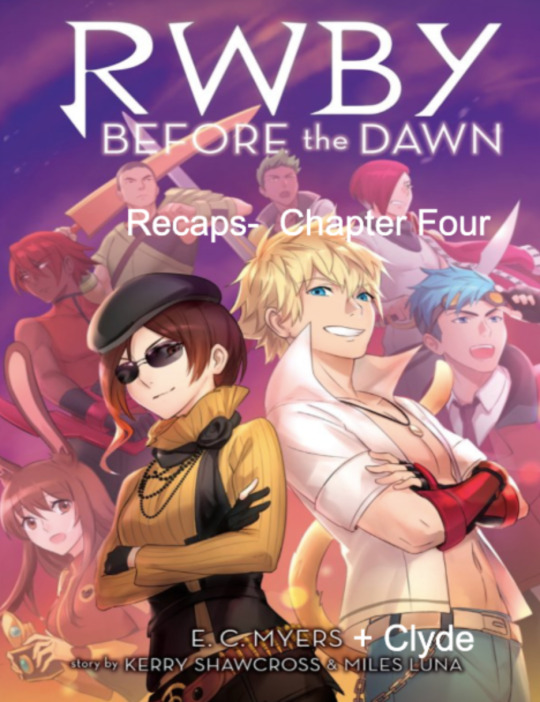
Hello again, everyone! This is a long one so let’s dive straight in.
We open up on Fox who, like everyone else in this novel, is upset about one thing or another. In his case it's that he wound up watching a club/gambling house (the exact nature of the establishment is murky) with Coco instead of patrolling the more lively restaurant and club district (even though this place, as said, is referred to as a club at time). Which, to be fair to Fox, is a legitimate complaint when you're blind and can't really do the whole "watching" part of the activity. Initially he believes that Coco must have a good reason for choosing him... “Unless he’d done something to get on her bad side."
In fact, this is such a likely possibility that Fox begins questioning Coco on where everyone is (a convenient way to let the audience know too), what they were assigned to do, and whether that assignment came about due to petty revenge. He complains that Team SSSN has gotten all the "fun stuff"—are you doing a job or goofing off, Fox?—but Coco reassures him that they're not being rewarded and he's not being punished. It's just that any other combination didn't sit right with her. Would Fox have enjoyed going off with Sun? No. If Sun was paired with another would they have wanted to watch Neptune? Not really. Does Fox even trust Sun? Not as of yet:
"I don’t know Sun yet. Not really. I guess I don’t trust Team SSSN to not mess things up for us. They’re sloppy and off-balance right now.”
Coco follows this up by saying that Scarlet and Sage get to guard the Academy wall because she doesn't want Scarlet near Sun after their argument at the group therapy meeting, and he himself is "too zealous" about protecting the Academy. So it's just easier not to fight him. “If we don’t want them to get in our way, or worse, raise a big enough stink that we can’t continue our investigation, it’s better to keep them involved in a limited capacity.”
Now, there's a lot to unpack in that statement and I'm not particularly impressed with any of it. First, it bears repeating that we're now four chapters in —about 60 pages in my PDF—and we're still dragging Team SSSN to the shattered moon and back. I'm not claiming that, as Fox says, they're not dealing with stuff right now, or that their emotions are clouding their skills and perception (I called Sun out for that just last chapter), but I certainly question the "friends" who discuss those problems in such a smug manner, rather than wondering if and how they might help. Thus far, the criticism of Team SSSN serves only for Team CFVY to continually paint themselves as the superior group. They assume that, unless handled delicately, SSSN would inevitably "mess things up" because they, at their core, are a worse team than CFVY. These comments exist only to boost CFVY's ego. Thank the gods we're not like that.
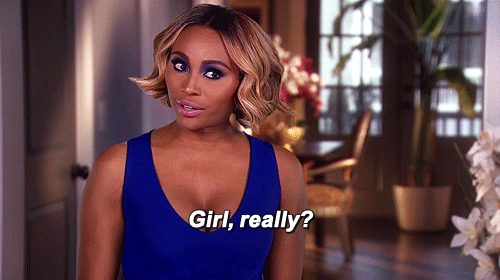
This is the same Coco who thought that she knew something about regaining the trust of her team. But does she extend any sympathy and understanding here? Nope. It continues to amaze me how often RWBY writes characters going through very similar, difficult circumstances and yet so few of them admit to those similarities, let alone act on them.
Second, in a franchise rife with themes about earned trust and manipulation, it's worth acknowledging that Coco moves everyone around, including her own team, based on pretty unsubstantiated emotions rather than logic. As someone who has done nothing but insult Sun to his face thus far, she hasn't exactly earned his trust either, yet she's willing to prioritize this assertion that he'll "mess things up" over the best choices for this mission. Meaning, Fox initially thinks that Coco, as a brilliant leader, has a persuasive reason for giving him this task. We learn she doesn't. He then thinks Coco gave him this task as a form of punishment. She didn't. So what are we left with? Coco claims she gave her orders based on her and Fox being able to chat (yay telepathy), but her explanation says it’s really about what she thinks SSSN might do, rather than what she knows her own team can do. At the end of the day (or night in this case) we've got the blind guy on stakeout using his telepathy to keep her entertained, rather than taking the mission he's both better suited for and enjoys more. Coco spouts a lot of stuff that sounds like leader-ly strategy, but in the end she made these calls primarily because she doesn't like SSSN.
So why are they working together again? Because the plot demands it? I wish the novel had done more to justify this partnership other than, 'If we don't let SSSN help they'll rat us out because they're terrible like that.' If the teams hate one another this much just let them work apart. Otherwise, please start the process of having them grow and begin to appreciate one another. As it stands, we have a few buddy-buddy moments that imply they’re “really” friends when the rest of the novel has done little to demonstrate that. It’s confusing at best and uncomfortable at worst, in the same way that watching the group happily invite Oscar to the movies after volumes of ignoring/attacking/using him as an Ozpin scapegoat is uncomfortable. It’s weird. I’m glad it exists, but how did we get here?
However, this growth isn’t going to happen tonight because Coco likewise ensured that no one is mixing. As Fox points out, "conveniently enough, this way you don’t have to break up our team, or mix them and us.” Nor has Coco broken up the usual partner teams of Sun and Neptune, Scarlet and Sage. Anyone who follows my other metas know that I'm waiting for the webseries to mix up RWBY and JNR more (thank you, Volume 8 preview), or at least have Blake work with someone other than Yang and Weiss work with someone other than Ruby, so I was disappointed to see this same trend not only repeated here, but celebrated by another character. Though not as overt as some of the problems in Volumes 6 and 7, this is what I mean by RWBY introducing conflicts but doing little to resolve them. It's a decent setup to pit SSSN's problems against CFVY's bias—When will Sun apologize to his team? When will Coco acknowledge that her intense criticism of him is born far more from assumptions than proof? When will both teams extend a hand to one another that isn't done in the name of self-preservation?—but thus far it's nothing but setup. And the longer it goes on the less a single scene of growth can stand up against that. The less space we have for that growth, period. This is my problem with many villain redemption arcs: a few episodes of contrite behavior cannot emotionally outweigh whole seasons of horrific actions. It's a presumed redemption based on audience expectations, rather than something we see earned throughout the course of the story. For me, there has to be a certain amount of time and effort put into that change. The worse the actions, the more time and effort needed to, if not absolve them, at least get everyone to a point where they can be set aside. Before the Dawn feels like a very mild case of this, in that I'm wondering how long everyone is going to act this way towards one another before things start getting better. The longer it goes on, the more I expect of the story in order to dig the characters out of it. Though serviceable, a scene like "Then Sun realized he was pushing everyone away and Coco realized she'd been too hard on him, so they both decided to change. Maybe for persuasive reasons, maybe not. The end" isn't emotionally engaging. The disagreeable characteristics across this cast are numerous, yet RWBY doesn't feel like a story where I'm suppose to dislike everyone in an entertaining way—a la Mean Girls.
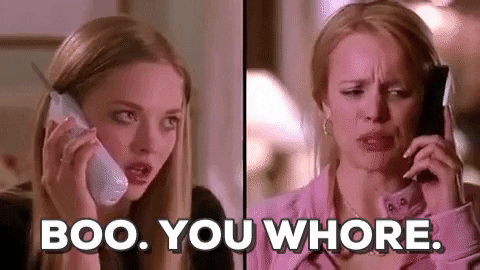
Thus, I'm wondering when we'll actually start the work of getting me to like this group more/getting them to like each other more, as well as how much of that work we’ll see overall.
Right, I've blathered on about this quite enough. The story (unconsciously I assume) continues to emphasize how expected it is that Coco would give awful jobs to teammates because she's annoyed with them, which doesn't say great things about her leadership, but that at least is something I could easily see a teenager with that kind of power doing. She and Fox round out the list of bad jobs by mentioning that Velvet and Yatsuhashi got stuck with grimm watch, "the duty of the low-rent Huntsmen who worked loosely with local law enforcement to help keep the peace." Given how they discuss this, the implication seems to be that this is an insulting job to give their teammates, which is hilarious considering that these four aren't even huntsmen yet. They're second years! 'What'd they do to deserve a job for low-rent huntsmen?' asks the guy who isn't a huntsmen at all yet.
We learn though that there has been a rise in grimm across the city. How did Coco get that information?
Coco laughed. “I snuck into [Professor Rumpole's] office.”
“Coco!” Fox said.
“Don’t lecture me, Fox.”
Fox smiled. “How dare you do that without inviting me,” he sent.
I get it. I honestly do. It may not seem at times that I understand that a story about a bunch of students has to find a way to get those students involved, or that these students, as teenagers, will do stupid things, that as humans they’ll even do horrible things... but surely there's a way to achieve all this without having our heroes constantly treat their allies in such a callous, disrespectful manner. Breaking rules is not inherently a bad thing. Some rules are unfair and upholding them does more harm than good. Some rules, while important from one perspective, can be broken without any serious repercussions. I never had a problem with Harry, Ron, and Hermione constantly breaking their curfew because kids sneaking out of bed isn't hurting anyone (overlooking the potential of the magic castle hurting them, but I digress). The rule exists for reasons like "You need enough sleep and are unlikely to get that unless we make you" and "A bunch of 11-year-olds shouldn't be left unsupervised in the magic castle" and "Learning how to follow some simple rules and listen to your guardians helps build basic skills needed for adulthood" but really? At the end of the day the Trio breaking that rule—particularly for good reasons like "We suspect nefarious Dark Lord shenanigans are afoot"— is far from the end of the world. Harry Potter also has the added benefit of making the adults actually useless and/or indifferent a lot of the time. We had a story where the kids, more often than not, were the last line of defense.
Rumpole? She is not useless or indifferent. Two chapters ago we established that she is conducting an investigation, Team CFVY just decided that wasn't enough because they want to be involved. And breaking into her office to snoop through her desk? That's not a harmless crime! Beyond the fact that Coco is looking for info she's not allowed to have and finding additional information she's not supposed to have, that's a serious breach of privacy. Clearly neither of them have enough respect for Rumpole to care about that though. Casual rule-breaking like that should be reserved for characters who have failed to earn the respect of the characters or the audience, demonstrating a lack of ethics that (arguably) justifies whatever they get. Basically, the Umbridges and the Lockharts of the world, not the Rumpoles who—far as I have seen so far—have done nothing but take their students seriously and adhere to not unreasonable expectations like, "Please don't get involved in something that might get you killed [cough-Sun taking on three goons-cough] and/or don't ruin the investigation I've already started." Or, at the very least, have the characters feel contrite and guilty about what they felt they had to do.
Why do I like these characters again? It would at least be more satisfying if the story acknowledged that the vast majority of our cast has turned into anti-heroes. I'm fine with that story! But not the one that claims it's "necessary" that our "classic" heroes pull stunts like breaking and entering, theft, lying, etc. without actually providing compelling reasons for those actions. Let Coco break into Rumpole's office, but do the work first of convincing me why she should be involved in this in the first place, why this info is necessary, and why doing that to an ally is necessary too. Kindhearted heroes should have a different reaction to unnecessarily breaking their instructor’s trust than laughter and jokes.

In considering how Before the Dawn intersects with the main webseries, I think it's also worth highlighting that casual line about how more grimm are getting into the city: "There’s been a rise in incidents of Grimm wandering into the city lately." That was one of the major conflicts of Volume 7 and one of the things the fandom uses as a means of mapping Ironwood's downfall: grimm were getting into the city and he failed to stop it, ergo he's a terrible leader, ergo he’s a terrible person, shooting Oscar is something I’d expect of him. Yet the same thing appears to be happening in Vacuo and, thus far, the story isn't interested in giving it the same gravitas. How are the grimm getting in? If the situation is bad enough that Theodore is sending both huntsmen and students to deal with it—“So that’s why Theodore’s been sending more students out lately, clearing the immediate area of Grimm"—isn't he a failed leader as well? Either one of these perspectives work, just not both at once. Either grimm attacks are an inevitable result of living in Remnant and the people deal with them without assigning undo blame, or both headmasters should be facing heat for failing to keep this from happening. So I'll be interested to see if this comes up again and, if so, how. Because right now Coco and Fox are treating it like a casual occurrence, whereas Volume 7 painted it as a serious failing.
We finally learn that Coco and Fox are watching this club because there are two huntsmen gambling inside instead of out doing their job. Except maybe they're off and just like gambling? How do they know there are huntsmen inside to begin with? Or, if they're unsure of that, why are they staking out this specific club? Did they pick one at random because clubs have been associated with the baddies? I feel like I'm constantly playing catchup with this novel. Details are mentioned like Meyers introduced them earlier (he didn't) but then those details still fail to help me make sense of the scene or the characters’ motivations. As I mentioned in the last recap, I never have both pieces of information: what exactly the characters are doing and why they're doing it. Fox and Coco's entire conversation revolves around Fox not know why they're here or what anyone else is up to, but instead of answering his questions we get pieces of information—huntsmen, clubs, grimm attacks, the Crown—that don't easily fit together but are presented as if they do. Then the plot just lands in their lap. Meyers never needs to explain why Coco took the time to stake out this particular club out of an entire city's worth because, of course, it just so happens to be the club where something nefarious is going on. Once they're chasing two baddies it's too late. We've moved on.
Before we get into that chase though, I'd just like to point out the exceedingly odd anti-huntsmen sentiment in this chapter. subtle, but there. As mentioned previously, we have a potential dig at low-rent Huntsmen and the kinds of jobs they do. Then we're told that
"Nothing much happened in Vacuo, and when there was an argument or a crime, people tended to sort things out on their own—with their fists. But when it came to Grimm, Vacuans depended on Huntsmen to fight their battles for them."
This one is admittedly me reading into things a bit (in case anyone missed it: I don't hold this novel in particularly high esteem lol) but "fight their battles for them" is usually a phrasing meant to carry another subtle insult. You need someone else's help and that's bad. Which makes a certain amount of sense for Vacuo's focus on strength, but I wonder why the huntsmen are getting brought into this for... doing their jobs? The explicit purpose of huntsmen is to fight grimm, so it's pretty weird to have a line that implies any negativity for them doing that. Oh, you need huntsmen to fight your battles? How horrible. Even though the huntsmen as an institution exist to fight those battles. It's like saying the first department has to “fight your battles” because you’re not capable of putting the fire out yourself. It carries an implication that, ideally, huntsmen wouldn’t be needed at all. Not because grimm go away, but because people would be able to fight grimm... even though, again, that fantasy already exists within the huntsmen. It’s just weird.
Finally, Fox outright theorizes that maybe there are more grimm because “the Huntsmen are getting lazy" and I'm just ????? You want to be?? A huntsmen??? What is this characterization? At best it reads like Meyers forgot that this group playing detectives are training to become a part of the institution they're criticizing. At worst it reads like the team simply believes themselves to be better than other huntsmen for undisclosed reasons. Like there are normal huntsmen doing grunt jobs and being lazy, and then there's Team CFVY who experienced A Battle and consider themselves vastly more experienced as a result (despite others like Scarlet trying to remind them that they're still only students). I doubt Coco and Fox will come to realize this, not unless something in Before the Dawn really knocks them down a peg, but I honestly wonder in these recent installments why most of these characters want to be huntsmen at all. It’s a job that requires adhering to a hierarchy of authority, obeying the laws of the kingdom you're in, and working closely with what allies are available to you. They don't seem to want any of that, but nor do they frame this as a flawed institution that they hope to improve: “Huntsmen do have a reputation for being lazy, but we’ll fix that once we get our licenses.” As it stands, they want to be vigilantes, getting praise for their deeds but being able to break the rules whenever they please.
Their theorizing is interrupted though when two huntsmen exit the club. How does Coco know they're huntsmen? Huntsmen don't wear uniforms and lots of non-huntsmen folk carry weapons... I simply don’t know. But these two offer to walk one of the gamblers home, considering he's won a fair bit of lien that night. Fox gets interested because their auras are bright enough that he can see them and they're identical, which isn't normal.
But wait. Back up.
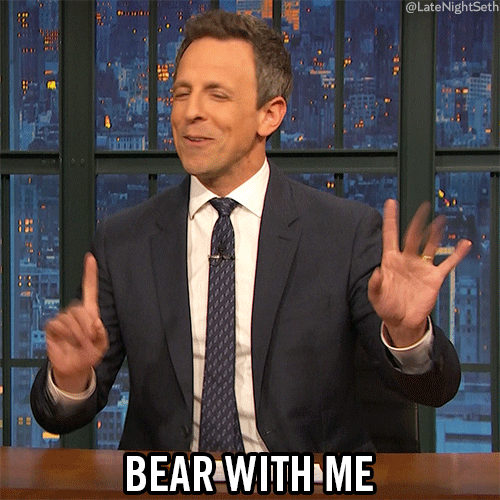
Can everyone see auras? Obviously we as the audience can, but the RWBY folk in-world potentially can't, not if Coco doesn't see how "vivid" these auras are herself. Fox is the one providing this information and Fox is the one who needs to track the huntsmen when they flee. This ability seems to be unique to him.
Why can Fox see auras then? That's not his semblance and, far as I can tell, it isn't logically a byproduct of telepathy (like how healing is a byproduct of Jaune amplifying aura). Honestly, it feels like 'The blind character has a special way of seeing the world' trope without actually explaining what that special way is or where it came from.
Why is Fox emphasizing that he can see the auras? The implication is that they're so powerful he, the blind guy, can actually see them... but how is he 'seeing' them the rest of the time? This isn't the first time Fox has been aware of someone's aura because he informs Coco that they're not normally the same color, but if these auras are unique because he can see them, what's happening every other time he comes across non-identical/powerful/weird auras? Does Fox just feel them somehow? Is it a non-visual sense and strong/weirdo auras propel it into sight as well? I'm very confused by all of this.
Regardless, it quickly becomes clear that these huntsmen are actually kidnapping the guy. Fox uses teamspeak to call everyone to him... including SSSN. So much for this remaining a secret until Fox trusts them! It would be one thing if Fox was forced to cast a wide net, but far as I can tell there's nothing stopping him from taking an extra two seconds to just contact his team. In the span of about a day in-world we're given two different explanations here. First it's
Velvet whispered a description of what they were seeing to Fox, avoiding teamspeak for SSSN’s benefit. No one found out about Fox’s Semblance until he trusted them enough to let them in on it.
then it's
Velvet jumped in. “It’s Fox’s Semblance. He’s telepathic. And he likes surprising people with it.”
So which is it? Does Fox treat his semblance as a closely guarded secret in an effort to protect himself, get an edge in battle, all that jazz, or does he just like waiting to spring it on people as a practical joke? Because if it's the former, Team SSSN haven't done anything in the last couple of hours to suddenly earn Fox's trust. Nothing we're shown, anyway. Rather, we just finished a conversation where Coco basically goes, 'You trust Sun?' and Fox's response, though somewhat noncommittal, basically amounts to a, 'Nah.'
Well, SSSN knows now. Everyone starts heading Fox's way while Coco interrupts the two huntsmen in the midst of their kidnapping. The kidnapee, a merchant, blurts something about not being helpless and Coco threatens to leave him.
"Coco had a real sadistic streak sometimes. Just one of the reasons she and Fox made great partners."
Hello, friends, family, and people of the internet: am I insane for thinking this is not how you write heroes? It's one thing if you're using "sadistic" as an obvious exaggeration—Coco playfully teases Velvet about her supposedly awful clothes. She's got a real sadistic streak—but threatening to leave someone to be kidnapped because, what? People need to act helpless enough for her to deem saving? Who writes their supposedly classic hero like that and then makes her partner go, 'Haha yeah she's mean. That's why we're friends :D'
Real badasses are kind and I stand by that.
Of course, the merchant immediately backtracks and Coco demands his release. Sun and Neptune arrive, recognizing the two huntsmen as the goons that Sun fought. There's some talk about a "She" who they're expected to deliver the merchant to and Velvet—again—brings up the rescue.
“You mean the ones we rescued Sun from?” Velvet asked. “Come on!” Sun sent.
Recurring jokes like this are only good when 1. The characters are established as actually liking one another (otherwise they're not jokes) and 2. It doesn't come up every other chapter. When the chapters are roughly ten pages each.
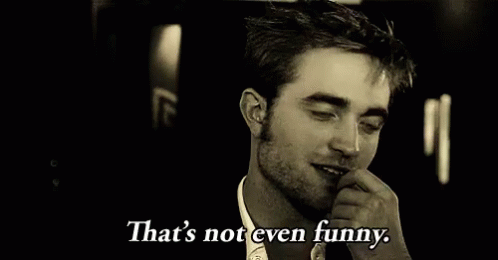
Before a fight can start though the goons give up, dropping the merchant and making a run for it. Fox is sent after them. He uses his ADA machine to navigate his surroundings, which is a detail I really like and appreciate. He's blind. There's no reason why he wouldn't use accessibility tools to assist him. So well done there.
The goons disappear into an abandoned building that ADA identifies as a former dust refinery. There's also a comment about how tall it is compared to the other buildings in Vacuo. Fox loses them because of the number of people inside—all those auras blending together—and, like the goons themselves, a lot of those auras "seem the same." Velvet and Yatsuhashi arrive to assist Fox... but their assistance amounts to Yatsuhashi trying and failing to cut down the door with his sword?? Then all those potential baddies know they've found the super secret hideout. Well done.
They're lucky they just asked for a password. Which, of course, the group doesn't know.
With more time to observe the mass of auras, Fox drops the bombshell that he thinks one of them may be Professor Rumpole's. The group quickly decides that she must be conducting her investigation, but the other obvious possibility that they don't seem to realize (yet) is that she's working with them instead. If Rumpole does end up evil or something I just want to say that my previous points still stand. It’s not okay for the group to twist her 'Don't get involved' into a 'Well, she just doesn't want us to get caught.' Not okay for Coco to sneak into her office and snoop on official reports. Sometimes people will retroactively absolve characters of bad decisions because much later the person who bore the brunt of those decisions turns out to be bad... but the characters didn't know that at the time. The Lockhart and Umbridge examples above work because they were introduced as terrible people who were then later revealed to be even worse than the characters previously knew: Lockhart moves from an inept, overbearing idiot to a con artist erasing others' memories; Umbridge moves from a cruel instructor to a torturer whose rhetoric aligns with the Dark Lord's. Rumpole? Far as the group knows she's done nothing but assist and teach them.
So the three are just standing around, wondering what to do and what it all means. Coco calls Fox only for Fox to immediately hang up on her because everyone is already using teamspeak. Why bother to call in the first place? I don't know. But they fill Coco in and she decides not to ruin Rumpole's (presumed) investigation. Which is good! Yes, Coco does it partly for self/team-serving reasons
Coco shut the idea down quickly. “If we interfere in her investigation and blow whatever she’s doing, we’ll get worse than detention. She’ll probably kick us out of Shade. And we’ll have ruined the usefulness of the information she’s gathering. I say we give her time to do her thing.”
but if fear of expulsion gets them to make a smart call, I'll take it. Besides, as Coco herself points out, they now have some leads to follow. They can continue their investigation without diving headfirst into the danger pool. Like Yatsuhashi apparently wanted to do. Attacking the door with his sword.
(Seriously what was the plan there? Cut open metal, barge your way inside, and take on a massive group yourselves—two of which you already know attacked Sun? It's an Experience™ to be in the heads of teens who think they're hot shit, but act so, so dumb. Admittedly this is something to praise about Myers' writing: of course the personal PoV of these characters is going to contrast reality. What they think they’re like and what an outsider sees will often differ.)
Coco goes on to reiterate that the merchant was "rude" about being rescued, threatening to “report us to the headmaster, once he found out we’re only students, not licensed Huntsmen." Which yeah, that's a dick move. Coco was awful for threatening to leave him, but if a bunch of kids saved me from a kidnapping I wouldn't threaten them with punishment because they're not the police. The implication is that he's xenophobic, given that he was a little too interested in how they're from Beacon/Haven and would only talk to Sun. Coco is "smug" about it.
Note the pattern again: Coco threatens something horrible, later the guy is revealed to be an asshole for unrelated reasons, so she's smug about her actions. See? He deserved what he got. But that's not how this works. If I walk up to someone and randomly punch them, then it's revealed they’re a criminal, I don't get to act all pleased that I spotted an asshole and took action early. I still punched someone without provocation. For anyone, but especially for a hero, ‘They were vaguely sort of mean/rude to me’ is not a good justification for objectively cruel acts. I’m looking at you, RWBY and Witcher.
More important for the plot, Coco reveals that the merchant doesn't have a semblance and the club owner claims the two goons really are huntsmen—though who can say for sure. With little else to do, Coco makes plans to return to Rumpole's office tomorrow.
“And snoop around some more?” Fox asked.
“No,” Coco said. “I’m going to ask her some questions.”
I suppose that's an improvement? I cannot possibly express how not engaging this mystery is though. It's vaguely confusing and feels all-around cobbled together. Every action the group has taken so far hasn't just been unnecessary (I prefer heroes who have a good reason—or at least perceive they have a good reason—for getting involved when others are already working to solve a problem), but it’s also dependent on coincidence to a frustrating degree. Even in a story where I know and accept and welcome some coincidence to move the plot along. But this? Sun gets involved because he follows a woman when he doesn't actually know if she's in trouble or not, but of course she is. Then they stand around a wall until the story drops a crying girl in their lap, because of course a person will have gone missing the second they need a lead and are in the perfect place to receive one. Then Coco seems to pick a club at random to stakeout, because of course that will be the one club where our two huntsmen/goons will be trying to kidnap someone new. None of their intellect, knowledge, or skills lead them to the next phase of the investigation, with the exception of Coco breaking in to steal info about the case. Obviously RWBY is not meant to be a classic mystery, but as a massive Sherlock Holmes fan this is a slog to get through. We have no compelling reason why the group is investigating and the investigation itself isn't teaching us anything compelling about them. This could have been the place to demonstrate how a huntsmen's skills go far beyond just throwing a punch. Instead we see... what? That Yatsuhashi can try to break down a door and say "Ow" about it? At least the webseries gave us two faunus donning grimm masks to sneak into the extremist, faunus-only meeting. Comparatively that's a leagues better investigation than the one we’re getting here.
Am I surprised? No. Do I still hope that this book will improve? Always. We'll see what Chapter Five gives me.
Until then! 💜
24 notes
·
View notes
Note
Why can't Sonic characters (any version) be treated like superheroes? I mean, sure, they don't have "secret identities" like most do, but they have abilities that most of their kind don't, it seems. They don't go out of their way probably to fight crime, but I'm sure Sonic would help out if he came across someone in trouble. Would it be fair to characterize him as an all-loving hero in the vein of Goku, who tends to makes friends of his antagonists?
I don’t think it’s… ENTIRELY unfair to characterize Sonic and friends as being sort of like superheroes. Also, like, the term “superhero” is super broad. Obviously you have the likes of Superman and Spider-Man and Wolverine, but then like you look at the modern Guardians of the Galaxy and they somehow count too. I think that the term “superhero” just tends to skew how the characters are written when applied to the cast of the Sonic comics
For example, the Freedom Fighters are a team with varied abilities who get sent out on missions to defend Knothole from evil. They’re literally defending the kingdom and upholding the law. The FF’s have Sally and later her dad as their commanders. Their Commissioner Gordon or Professor Xavier, if you will. (Soon, Max is even gonna start showing up in a wheelchair. It would not surprise me if this was a reference to Xavier.) Sonic has a tragic backstory that inspired his heroics (his family getting roboticized). As of Super Special #12, they even have their own X-Jet to get around as a team.
Many writers have also tried to give Sonic a superhero-style rogues’ gallery, either promoting minor antagonists to be bigger threats or just straight up introducing new bad guys like Kodos or Mammoth Mogul (who sure looks a hell of a lot like Wilson Fisk). I wouldn’t pin this as a superhero thing under later writers per se–like, Ian using Team Hooligan isn’t necessarily a sign of him trying to write Sonic like a superhero–but it felt like the Archie writers of the ‘90s thought that Sonic needed a rotating cast of supervillains to steer him into more familiar territory, and as such kept adding more
And like, most of this is fine? A lot of it just doesn’t really fit Sega’s version of Sonic
The superhero coding is probably even more visible in Penders’ Knuckles series. They’re primarily set in one city, for one thing. You’ve got normal cops like Remington, and then Knuckles is basically a vigilante using his mutant powers to fight crime and villains as he sees fit. Penders even gave Knuckles a superhero backstory, making him the product of genetic experiments. That baffling arc with the Chaotix fighting a drug dealer from the criminal underworld sure makes more sense if you realize Penders thought he was writing a superhero comic. That would’ve been totally normal in a series like Spider-Man! And of course the female echidnas have very Kryptonian hyphenated names
What’s Sonic ACTUALLY supposed to be? I mean, he’s a mascot character, for one, which means he kinda plays by different rules so as to protect Sega’s brand. But I think shounen anime protags like Goku or Luffy are a pretty good reference point. He’s a good guy, but he generally seems more interested in adventure and competition than fighting for justice. (His theme in Adventure, It Doesn’t Matter, is even about how Sonic cares less about right and wrong and more about gut instinct.) He’s kind of mercurial and stubborn and does whatever he wants a lot of the time. He has a big appetite for his favorite food. He runs off the power of friendship, and has a tendency to befriend former enemies. And of course, he has multiple powered up forms for him to take down big bads in climactic showdowns
64 notes
·
View notes
Text
Will You Walk Into My Parlour
I literally started to write a few words before crashing after being awake for over 24 hours, and now I’ve been awake for over 36 hours and really need to sleep… but I’m done. For @dimenovelhero, because their Jack just is movie Jack.
When Lucille Delancey was a young girl, she can remember her mother giving her advice on a cold night, lines of frustration etched into her face in the dim moonlight.
“Be careful of men whose smiles hold something you can’t quite place,” she had said, her eyes distant. “Those are the kinds of men you have to watch out for.”
OR
Lucille isn’t sure when she started lying to the cops, but she’s decided that there is no time quite like the present.
The first thing that told Lucille that she was not alone in the theatre was the strong smell of cologne. Even the most boisterous of the men backstage didn’t wear anything like it, the door to the costume room propped open to let the summer air in. It had been hot the past week, but a rainstorm had cooled things off, and most of the back doors had been left open to let the rest of the theatre take in the breeze. It was luck, really, that led to the shift of wind— brought about by the doors to the lobby being opened and sending the once-peaceful currents wild—but the smell of cologne was enough to drag her out of her work and into the man that had found his way to her workspace.
She knew for a fact that he didn’t work in the theatre, and not just because no prop master or chief of the flies would smell so strongly of sandalwood and vanilla. No, it was the fact that not even the workers in the box office would wear clothes like he was wearing, cravat and three-piece suit out of place among the rolled up sleeves and constant motion that happened whenever a show was nearing opening night. Even Lucille—who was wearing a plain black dress and a dye-stained apron—had rolled up her sleeves and tied her hair out of her face, a piece of chalk stuck behind her ear, leaving traces of white on her shoulder every time she brushed a stray curl aside.
It was almost impossible to not notice the man, his cold eyes watching her every move long before she had noticed his presence. The costume she had been working on— meant for their villain, if she could ever figure out the best way to balance richness with cruelty— had taken over most of her waking thoughts, sketches and pattern swatches filling every surface in the room.
The fact that someone was hovering in the doorway startled her more than she cared to admit, her heart racing slightly as she tried to ignore the ice that had filled her veins. Jack and his friends were her usual visitors, always shouting greetings down the halls and laughing loudly before they got to the costume shop— never watching her silently from the doorway or coming by unannounced.
“Can I help you?” She asked, quickly setting a pile of sketches aside so that she could make room for some fabric she had found, the beginnings of a silk brocade vest more important than the random pieces she had been dreaming up in her spare time. The man seemed familiar, annoyance tugging at the back of her mind. “If you need the owner, she’s dealing with—“
“I’m looking for someone. I believe he might work here.” The man interrupted, his cordial smile much too tight as he offered her a picture— no, a mugshot, she quickly noticed. It was the moment that she recognized the boy’s eyes that the man’s name clicked, and her posture shifted slightly, as if closing him off. Snyder, Warden Snyder, the self-important man who picked up his suits over four hours late after fussing endlessly about needing them as soon as possible. It had been years since she had worked in Mrs. Grosskopf’s shop, but she could recognize his haughty attitude just as easily as she could recognize the intensity in Jack’s eyes. “Francis Sullivan?”
“I’m sorry, the name doesn’t ring a bell.” She replied, returning the picture as she busied herself with neatening up costumes she had pulled for repairs, absentmindedly separating piles of buttons from each other as if she wasn’t being scrutinized by a man who can and would lock her up and throw away the key if he knew she was lying. What was that legal term she had read before in a dime novel? Obstruction of Justice, a heavy name for choosing a friend over the law. “I can check the cast list if you’d like, but Miss Medda is the one with the payroll.”
She knew the name Francis Sullivan wouldn’t be on either list, just as well as she knew the boy in the picture was known as Jack Kelly to her. It wasn’t a lie, per se, but she knew it wasn’t the truth either. Still, to appease the man— and get him out of the theatre before Jack came in— she glanced over her list of actors, pretending to be concentrating for far longer than it would usually take to go through the list.
“I wish I could do more, but Francis Sullivan‘s not on my list. Perhaps I can ask around, Mr…?” The smile he had been trying to soothe her with tightened slightly as she rebuffed his efforts, seeming more like a cat cornering a mouse than an upstanding citizen trying to uphold the law. It chilled her blood, and set her on edge, and reminded her too much of a conversation she had once had with her mother as a child.
“Be careful of men whose smiles hold something you can’t quite place,” Abigail Delancey had said, brown eyes distant as she spoke to her only daughter. “Those are the kinds of men you have to watch out for.”
Lucille did not have much time to think on the reminder before Snyder spoke, his voice far sharper than it had been before.
“Warden Snyder, although that is not necessary.” He said, the haughtiness shining through despite his best efforts to charm her. She was reminded of a poem she had read in grade school, a dismal tale of spiders and flies and false flattery— one she’d never understood until the moment her own spider attempted to snatch her out of thin air. “I heard rumors that someone matching his description was seen around here—“
“I’m afraid that if he isn’t an actor needing a fitting, I don’t know him.” She replied, an edge in her voice that she usually only used when Oscar was being stubborn. Without giving him a moment to cut her off, she quickly slipped passed him, making it to the door before he could stop her. O’Riley was preparing to take his smoke break, just close enough that she was able to grab his sleeve, a nervous look on her face once her back was to the Warden. “I’m sure that if you’ll wait until rehearsals are over, O’Riley can take you to Miss Medda… I’m afraid that the wardrobe manager just isn’t the place to go looking for convicts. He’s not hiding in my gowns, that’s for sure.”
It was a gift from god that the bouncer noticed how uncomfortable Lucille had become, and that she had been able to easily play the part of a simple-minded seamstress— no doubt the same role he thought she played back when she worked in Brooklyn, where she would find ways to hide straight pins in his seams to spite him. Snyder had no time to protest before O’Riley was rattling off the schedule for the rehearsal and leading him towards the front entrance, the sound of the stage door slamming shut behind them as sweet as a choir of angels. For a moment, she waited to make sure they were truly gone, before moving to shut her door—
Only to almost slam the door in Jack’s paling face. She wasted no time in pulling him inside the safety of the costume room, closing the door and sliding a chair under the knob for good measure. Although she kept a polite smile on her face, she could tell that Jack understood what he almost walked into, and she silently thanked God that he knew the theatre’s hiding places better than even Medda.
“Who was that?” He asked casually, despite the fact that she could see how his eyes flickered nervously between her and the door.
“Warden Snyder— from that prison on Randall’s Island. It’s the funniest thing, you know. He came here looking for some boy named Francis Sullivan, but I’ve never heard of him. I had O’Riley set up an appointment for him to talk to Medda about checking the payroll for around eight, after rehearsal.” She said sweetly, doing her best to pretend she didn’t see how Jack stiffened slightly. She could pretend to be clueless for a moment longer, at least for his sake. “Speaking of rehearsal, I won’t be needed for the whole time, so I wondered if you wouldn’t like to get that coffee tonight— maybe have us leave at around six, before things get too crowded?”
She knows Jack understands what she’s meaning, even if she’s once again busy with the costume. For a moment, she pauses, a new idea for their villain’s costume— far-too formal dress for the setting, black cravat and three-piece suit standing out among Medda’s cheerful gown and the western scenery. As the thought appears in her head, she gets a wicked smile on her face, scrap of paper already in hand as she glances back at Jack.
“We don’t have to stay there to drink it, you know. It’s whatever you want to do.” And whatever you want to tell me, she wants to add, but she lets the messy sketch she slid across the table do the talking, an unflattering picture of Warden Snyder staring at his pocket-watch— steam coming out of too-large ears— scribbled over an ad for a used dictionary as he had interrogated her. A smile finally broke through the worried look on his face, and as Medda called her from down the hall, she couldn’t help but notice how he pocketed the drawing, nor how he thanked her in a quiet voice when she walked passed. She nodded silently, not admitting any part in her obstruction of justice, but still a bit too proud of herself.
When her mother had issued her warning on that winter night, she had no idea that it would be useful on a pleasant summer afternoon, nor that it would be used against an upstanding officer of the law instead of the boy she had let charm her into lying. Sometimes, life was funny that way… and, sometimes, the lessons you’ve been taught end up being wrong, while the people you should trust are the ones you should fool. Either way, as she showed the new design to Medda, and earned enough money for two coffees and a scone or two, she knew that there would be so much more to come.
After all, if she’s already lied to police and obstructed justice, she might as well keep going.
#this was hard bc i wanted to try to show how fast paced lucille is#bc she always seems so absent minded or distracted when really shes just constantly thinking#Shes got costumes to do and family to help and cops to lie to#(and shes ADD like morris but that wont be a thing for another century)#so her mind literally jumps from subject to subject#also the title comes from the spider and the fly#aka the poem/book my librarian read to us when i was seven#and ive been fascinated by it since
3 notes
·
View notes
Note
I apologize for bothering you for your objective opinion so much, my king, but once again I need your objective opinion. This time I need your objective opinion on the Berserkers. I'm severely concerned that I have shit taste in Berserkers, and I know that unlike me you are definitely a man of culture.

very large. back from ye olde days where berserkers generally couldn’t actually communicate so unfortunately a bit lacking in complex characterisation compared to others. lovin the whole ‘made to kill his own children in rage which is what qualifies him as berserker in the first place and now gives his all to keep this singular parentless child safe despite supposedly being made into a mindless raging beast’ thing. 8/10
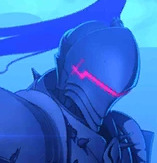
bucket knight. also an old school zerker who can’t talk outside kariya’s fever dreams but he does scream in french sometimes. an overly loyal knight who nonetheless put his own wishes above what he believed were his king’s once and then spent the rest of his life feeling guilty about it to the point where it straight up drove him crazy because he couldn’t understand that arturia has -15 consideration of her own wants. his kink is getting shamed and he would probably get a heart attack if arturia did that hands on her hips disappointed look pose in his general vicinity. 8/10
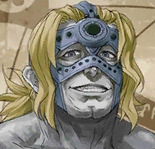
get OUT of my HOUSE. ugly and horrifying but could totally beat gilgamesh in a fight and the image of ol gregory getting his nuts kicked in by a metal underpants enthusiast is high quality content so he gets points for that. 3/10
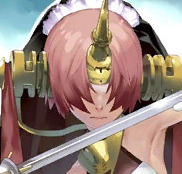
this is what we in the scientific community call a daughter. a good girl who just wants to be loved but has severe trust issues after being abandoned by the person who literally created her. can in fact talk but it takes a lot of effort so she doesn’t bother because like, fuck humans right, why should she put in effort to make herself understood when they’re not gonna want to understand her either way. I’m so blessed & grateful that moriarty is her dad now. 9/10
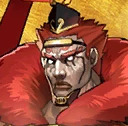
i’ll be honest I still have no idea what his character is supposed to be like its not like he had a lot of screentime in extra and extella is very bad to its side characters. ?/10
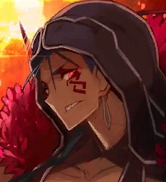
the fucking supreme. pandered to like a dozen of my kinks and gave me a few more. my first 5*. the end of my f2p days and the start of my journey to becoming the monster god. the design. the skillset. the teeth. the c l a w s. a king despite hating kings. a machinelike killer despite living for the thrill of the fight. a man who wants to just die already yet obstinately refuses to. a contradictory mess that denounces every ideal he used to live by yet clings to them harder than ever. a monster whose personal arc after being summoned isn’t how he’s still human at heart or whatever but how he was a monster before he looked like one already so like, don’t even worry about it. his mad enhancement is EX(C ) and his material entry revealed that this weird rank is bc it’s not even actual battle rage, he’s just so fucking stubborn it gets classified as mad enhancement. EX/10 the love of my fucking life

the smile of an angel. seems completely rational at first but is still classified as a berserker with EX rank mad enhancement because of her inhuman determination to save as many lives as possible without any regard for the quality of that saved life. she’d amputate all of a person’s limbs in an instant if that’s what it’d take for them to not die. she has canonically beat people to a pulp to ‘cure’ their mental issues. completely dedicated her life to becoming a healing machine at the cost of her own health and even personhood. her profile says she doesn’t actually listen to others but in her myroom lines she takes an active interest in your hobbies and opinions and she also gets flustered when you call her an angel. i literally cannot fucking wait until ch america hits NA server she’s so fucking good and i want everyone to love her. 15/10

THIS IS WHAT A FRIEND LOOKS LIKE. the actual embodiment of “cool guy has a chill day”. a smile that rivals the sun and an attitude that turns even the most ordinary days into a grand adventure. his mad enhancement is basically just that he’s kind of an idiot. 10/10
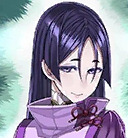
OX MOM OX MOM OX MOM her mother got knocked up by an ox demon in a dream and had to raise her in secret, and her human father didn’t accept her until she proved to be really strong and even then only as long as she would exterminate anyone who stood in the way of the clan. so scared of being shunned for her demon origins despite being loved & trusted as leader of the minamoto clan that she straight up exorcised her demon self into a separate personality to kill it (& herself with it) and was only barely stopped by the four heavenly kings. nowadays fiercely protective of anyone who knows about & accepts her demonic side to the point of insanity, which is where her EX mad enhancement comes from. a huge crybaby but gets shit done anyway. 10/10
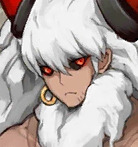
THIS IS ALSO WHAT A FRIEND LOOKS LIKE. someone who was labeled and locked away as something evil due to being what is by all means called a monster even though he’s got a really gentle personality and likes being helpful. really good example of the whole “heroes and villains are nothing more than the roles individual complex people are forced to take on” theme fate likes to play with. has difficulty talking but it’s easy to come to an understanding with him as long as you call him by his personal name asterios rather than the name of the monster minotaur everyone assumed he’d be and he thus inevitably became. 10/10

the only reason he’s a berserker is because his name and the word “berserker” have the same etymology and the grail had no idea what other class to put him. this is the canon reason. he doesn’t have any mad enhancement to speak of beside being a lil hot blooded and liking to fight. literally only here because he likes to throw punches. got his ass beat by li shuwen in ch america because despite loving to throw a punch he’s not actually a martial artist and can’t win from someone with actual technique. a classic ‘jack of all trades master of none’, he literally sucks at being every single class but can’t not be summoned as a heroic spirit because he’s from the oldest english epic poem and a prototype for many other heroes. a free spirited adventurer who takes things as they come but can be responsible when it matters. 9/10
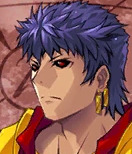
once a good & wise ruler but fell into insanity in the last few years of his rule before finally getting assassinated. loved rome with all his heart for its beauty & splendour but got overwhelmed by the conspiracies and other evils that were also a part of it until the goddess of the moon, who he was in love with, made him insane, which he claims saved him in his bond ce. determined from then on to become the ugliest most evil motherfucker in all of rome so that he could take all the nastiest parts of rome with him in his inevitable death and have his dear cousin nero live in happiness, if only for a while. summoned as a hero despite being very close to an anti-hero because the good ruler he was before going insane responded to a call to save the world and still intent to do his part by simply dragging everything evil down with him. 8/10 wouldn’t it be nice if chapter rome had actually paid attention to roman servants other than nero.

looks like a bratty child but talks like an archaic mob boss. has horns and huge claws. easily bribed with chocolate. has a huge sword but just fucking headbuts her enemies instead. 10/10
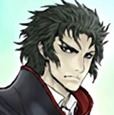
many berserkers are angry men but only he is anger man. classified as a berserker not just due to his battlefield conduct but also the insane commitment he had to the laws of the shinsengumi, to the point where he would personally execute former comrades who broke them. both the first and last member of the shinsengumi, a man who dedicated his entire life to upholding its values in a rapidly changing japan. surprisingly rational and during gudaguda 2 okita didn’t even realize he’s a berserker because he didn’t become the fanatic that qualified him to be summoned as one until after okita’s death. one of the coolest skillsets in the game and definitely some of the sickest animations. 10/10
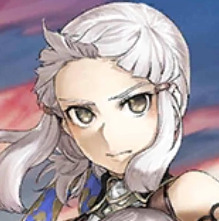
NORMALISE
FINDING
AND KILLING
ACHILLES
10/10
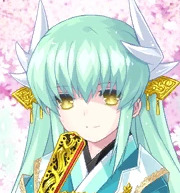
my fuckign girlfriend 10/10
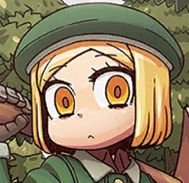
the cutest enabler. 10/10
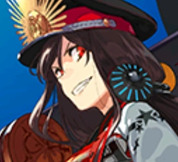
please god let me meet her. 10/10
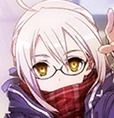
when will takeuchi die
638 notes
·
View notes
Note
then u can't argue for hufflepuff alec either, since he was also willing to torture meliorn, kill a bunch of downworlders -> his baby sis built a torture device which she and her friends used for fun and profit. All of them were also complicit in the soul sword conspiracy which I think substitutes for upholding oppressive laws. Can they be in their assigned houses? /it’s a genuine question from someone who’s not all that familiar with hp/
i mean my point was exactly that it doesn't invalidate them being on hufflepuff, but yeah. i mean jkr did kind of try to make the houses a moral thing (like all the villains are from slytherin basically lmao) but what im going with here is not that, because it's dumb. the houses are supposed to represent ur highest values, so yeah, u can be a ravenclaw and use ur knowledge to build an atomic bomb and generally be a terrible person, or be a hufflepuff but be selfish, or be a gryffindor because ur a gross macho asshole who wants to prove ur worth by showing how braaaveeee you are, or be a slytherin and want to be successful so u can work to make the world better (like alec). they are morally neutral, it all depends on what u do with that
im not an expert in hp lore either because like i said i never liked the books, and tbh the lore is almost as precarious as cc's so like lmao. she didn't really explain things or straight up contradicted herself many times, and just generally underdeveloped basically everything for a generic "good beats evil" story. but for some reasons i find sorting ppl into houses a fun exercise on character analyses, kinda like that "personality types" stuff that's equally bullshit, but fun to think about in a fictional context u know
0 notes
Text
New from Every Movie Has a Lesson by Don Shanahan: MOVIE REVIEW: Coffee & Kareem
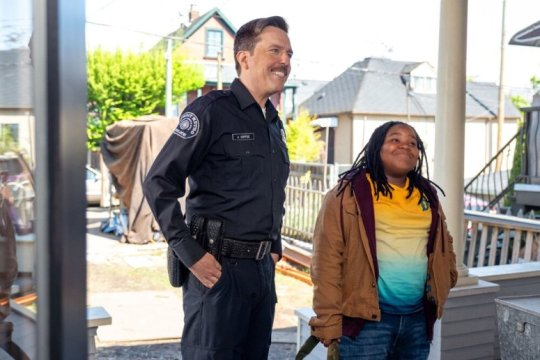
(Image by Justina Mintz for Netflix)
COFFEE & KAREEM— 1 STAR
The posters for Netflix’s latest action comedy Coffee & Kareem (which is silly already because it would never see a theater, with or without a pandemic shutdown) have been trying to splash its stars Ed Helms and youngster Terrence Little Gardenhigh in classic poses, fashions, and fonts from Beverly Hills Cop, 48 Hours, and Die Hard. The crack marketing department is really trying to get your nostalgic attention for the violent and raunchy R-rated cop movie of old with this PhotoShop power play. Catch a whiff right here:
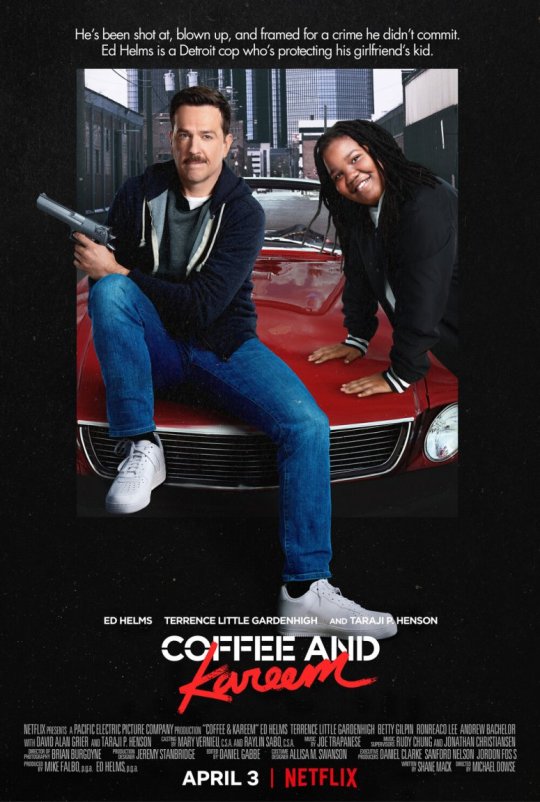
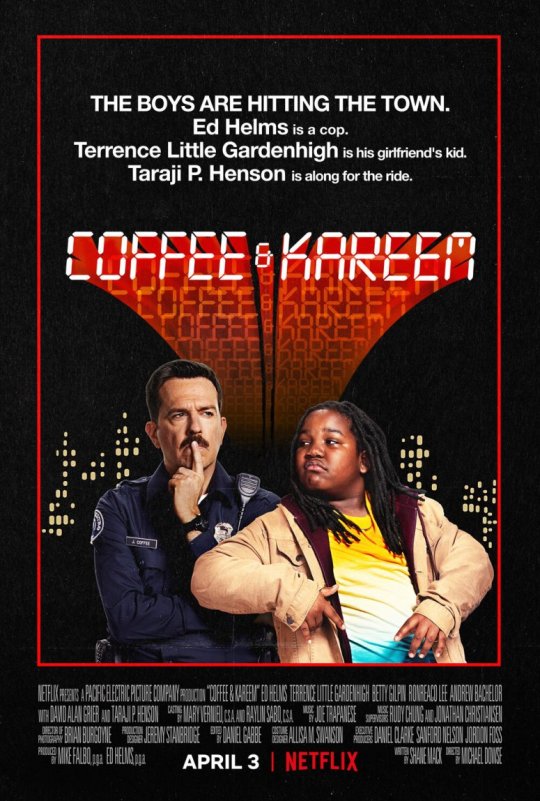
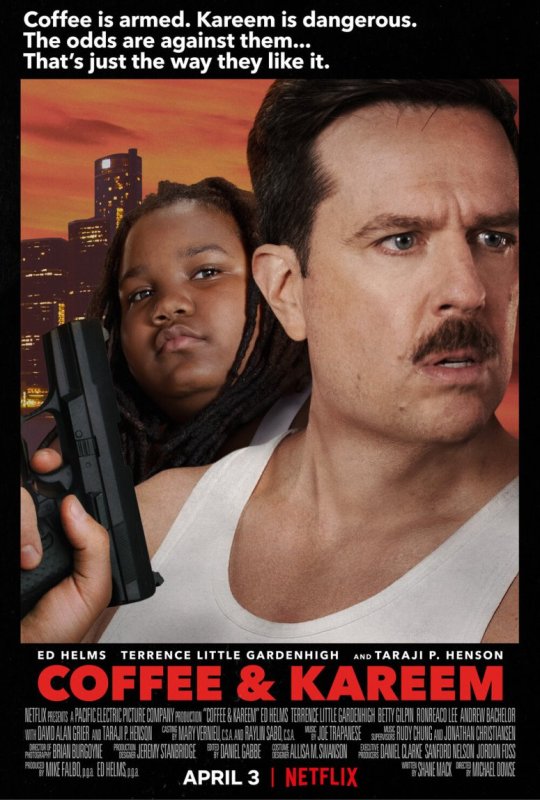
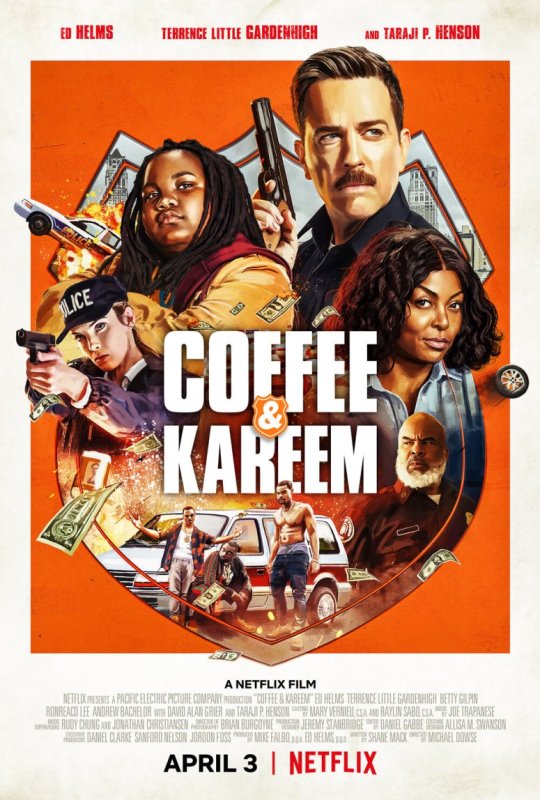
Those posters clearly catch the eye, but once Coffee & Kareem attempts to evoke the promotional notion that it is worthy of standing next to classic giants like those three films as a homage or even as an lesser riff, it’s asking to bomb.
LESSON #1: DON’T PRETEND TO BE SOMETHING YOU’RE NOT— When you fail, even intentionally, you become one more shitty cop movie from a generation ago. Does someone get an award somewhere from some lofty agency of aficionados when you make a shitty cop movie precisely as shitty as the old shitty cop movies this shitty cop movie emulates and remembers? Is that a Razzie or something else?
James Coffee is a mustachioed and divorced peace officer in the city of Detroit who naively loves Hall & Oates, upholding the law, helping people, and, yeah, yeah, yeah, the straight do-gooder wussy stuff you would expect. He is a complete dolt, played by the actor with the most locked-in doltish gear in the business in Helms. With a salt-grained hint of spice, James is bedding Taraji P. Henson’s hot, black, and widowed nurse named Vanessa. She is the mother of Kareem, her pudgy and fast-talking teenage son, played by the feature-debuting TV actor Gardenhigh.
In more than the usual “so many words,” Kareem doesn’t like where Coffee’s nightstick has been. He plots to pay off a popular juvenile convict named Orlando (RonReaco Lee) to rough the dorky cop up to scare him away from his mom on a day when Coffee is picking the teen up from school. Orlando is, coincidentally, a collar Coffee embarrassingly lost which resulted in office chiding from his superior (Betty Glipin, recently of The Hunt) and a traffic duty demotion from his captain (a gray-bearded David Alan Grier).
In propositioning the former hood, Kareem (and a tailing Coffee) are caught at the scene of a cop execution, one that Kareem records on social media. In the cross hairs of their own at-odds foolishness, the titular duo find themselves mixed up in dirty cops, tasers, drug deals, media-spun kidnapping confusions, gun play, constant racial and homophobic faux pas, and a heap of danger that will get them both in boiling hot water with Vanessa, let alone iced-down toe-tagging coroners and other higher authorities.
Coffee & Kareem surges for maximum sarcastic sacrilege out of all involved. Lovers of good roasts laced with compound obscenities will have much to love. Especially with Terrence Little Gardenhigh, this is way past Kids Say the Darndest Things. The savage vitriolic humor he spews, whether it’s scripted or ad-libbed, is snappy for sure and also vile beyond comprehension at some points. The second best stinger in the hive is Betty Gilpin busting balls like they were loaded in a Whac-A-Mole machine.
LESSON #2: MEN OF ALL AGES ARE HORRENDOUSLY INSECURE— Thanks to the profanity, the loudest and bluntest message this movie has is trying to present all of the possible the insecure posturing males attempt when trying to think and be tough. They exaggerate. They lie. Their mouths get them in trouble. They get called out on it, and they furiously flail and fail. That’s not exciting. That’s sophomoric.
Returning to the opening rant, where Coffee & Kareem treads on greatness and fails miserably in trying to be tacky tribute to comedy gold is in the stakes department. As irreverent as Eddie Murphy or Bruce Willis ever got in their iconic wiseacre roles, their movies had actual peril and imposing boundaries. There was either an authority figure peer or an indomitable villain (often both) that always grounded the kite-flying humor back to the grit that was a tried and true cop movie. With that edge, the humor was wiser and the body counts mattered because one of them could, at any point, become the protagonist or someone they or you cared about.
Zero of that level of sharpness or heft exists in Coffee & Kareem, directed by Stuber helmer Michael Dowse, who knows his way around the 80s with his career peak Take Me Home Tonight. The closest you get is Taraji P. Henson staring holes through ignorance, shouting more F-words, slapping tastes out of mouths, and whipping ass in her fleeting Pam Grier-esque moments to dominate. That was never going to Gilpin’s rival or any of the gun-toting henchmen. Instead, the best you get is some partial heart from the range-less Ed Helms connecting with the kid and the attempt of sacrificing his well-being to save who he comes cares about. That’s weak sauce here.
At around the one-hour mark with just about 30 minutes remaining in this economical one-nighter, Coffee reaches a point where he bemoans Kareem “Just pull over and stop. Let them kill me. I’m done.” Boy, after the hour that was already had, filled with dumbfounded narrative and creative choices, fake trauma, and forgotten consequences, he ain’t kidding. Pass the bullet and the remote.
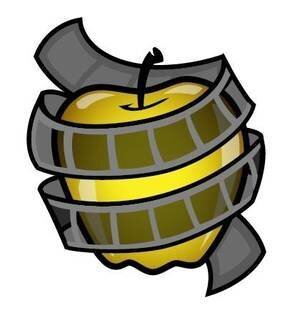
LOGO DESIGNED BY MEENTS ILLUSTRATED (#868)
Permalink
from REVIEW BLOG – Every Movie Has a Lesson https://ift.tt/39xWdBS via IFTTT
from WordPress https://ift.tt/3bZvBvl via IFTTT
0 notes
Text
Favorite characters meme
@myheartgoesswimming tagged me in this!
“Post 10 of your favorite characters from different fandoms, in no particular order, and tag 10 people [if you want!] “
I’m a JERK who can’t help but rank my favorite characters,
Favorite male characters:
1. Jacob Frye Jacob had an absolutely unprecedented climb up my favorite characters list. He went from being this butch asshole in the trailers for AC:S to...I LOVE MY BI SON??? I don’t think I’ve purely identified with a character so much since Marian Hawke in DAII when I was a closeted 18 year old who didn’t think I’d ever come out. Like, I’m ultimately not too protective of my favorite dudes--I look at my list and I’m like, yeah, this is mostly garbage. Jacob is the one dude character who I have actually cried over people saying shit about him (I casually call Jacob garbage a lot, but not too long ago a good friend said “yeah, he fucks up everything. really everyone would be better off without him” and I cried harder than I thought I would).
I identify with Jacob because he’s a giant ADHD bisexual who messes up literally everything he does but still tries the best he can to be a good person and he’s someone who still legitimately cares about people who have hurt him deeply. At the same time, he’s not a queer character that wants to fully integrate with society either. He’s funny and loves his sister and she’s a better Assassin than he is. He’s a good person but his queerness isn’t clean--it’s rough and it hurts and it damages his relationships and it’s so real to me.
I’ve never felt happier about being bi and not totally good at things than the months after AC:S came out and Jacob was announced as canonically bisexual. Before that I’d been struggling a lot with the lesbians v. bi women thing, and Jacob just made me feel so good about myself and so hopeful. I love Jacob Frye.
2. Johannes Cabal I have never been more right about a character’s ultimate arc than I was with Cabal. He’s been on my list of faves for years, but the fifth book jettisoned him into second place among the guys. If he were canonically queer he and Jacob would probably be tied tbqh. I love this horrible man. I love his arc. Anyone who wants to write villains with a redemption should read these books. SPOILERS but I love how his arc isn’t about accepting things the way they are re: death. He never accepts the Bible, never goes to confession and gets his sins forgiven. He never gives up his desire for things to be changed and for the unfairness/injustice of death to be righted and his disbelief in religion as a savior. He never gives up his arrogance. He’s still really smart.
But by the end, he becomes a human who is worthy of having friends and is capable of doing the right thing and that means so much to me. I expected a giant Thing at the end where he did something truly villainous to show that he was Always That Way and Always Would Be, but it never happened. He slowly defeated evil within himself without even knowing it, and that matters to me.
END SPOILERS. The second trash wizard I ever fell in love with.
3. Loki (MCU). Oh, Loki. My queer rage analogue.
Some context: I saw Thor (2011) when my family was falling apart. I was mad, so mad. That scene when Loki confronts Odin was so profound to me--I read it as a coming out scene, and I know a lot of other queer folks did, too.
I’ve known I was bi since Dragon Age II, as dumb as that sounds. When I wanted nothing more than to romance both a dude and a lady. BUT I had planned to bury it. It was easier to just date men, so why not? When Loki was revealed as Canonically Bisexual, that was really when the word clicked for me. That was the moment I think I knew that word was truly inescapable for me.
Whoo boy. That scene in the Avengers when he shows up after creating a portal with the Tesseract and intends to tear the world apart...that’s the moment I realized how queer and angry I was. I was closeted and wanted to burn it ALL down. He would either win or be destroyed, and the fantasy of burning as I was was so satisfying to me--either way he was going to die as himself. I was sitting in the theatre and that was when I knew I had no choice but to come out. I was afraid. Anger was an easier feeling to have.
Loki. My reminder that I’ll take a queer villain over a Perfect Queer (TM) every day of the week and also for the rest of my life--I will never, ever care about a Perfect Queer, because that’s not what I am, that’s not the family I come from, that’s not the reality of my health or what I aspire to be. That rage gave me the courage to come out, and tbqh it gives me strength now.
4. Harry Dresden Harry is Trash Wizard Prime. I discovered him during a time when men were an absolute mystery to me--I didn’t grow up with many (any) good male role models. As a bi teenager, I started to notice men because that’s the thing girls attracted to men were socially supposed to do, and I realized I didn’t understand them.
I saw the cover for Dead Beat in a Barnes & Noble and I picked it up. He looked so dashing, so rogueish. And this chaotic good motherfucker is that. He cares about people and wants to do the best he can with his gift, even if he is imperfect, and that spoke to me as a teenager so much.
He was a male character who I felt safe with. Society hated him for his gift, and sometimes did its best to destroy him even while he was trying to be good (which, in retrospect, is one reason why I associate mages/wizards/witches with queerness). I felt like he was a man who would protect me as a girl who, at that time, thought of myself as het but who was very afraid of men (L O L. LOL. L O L. Biggest joke ever) and who had experienced trauma at male hands.
I felt deeply betrayed when, after Changes, he had intrusive thoughts about raping the women around him.
I don’t quite have words for how much that hurt. Cabal was never misogynist in quite that way, and Loki is a virulent misogynist, but in a way that strikes me as very real for some queer men (not okay, but A Thing That Actually Happens). And as someone with OCD who experiences damaging intrusive thoughts myself, I feel like should have understood.
I felt really betrayed when Harry’s character took that direction. It caught me by surprise. It was actually triggering for me--the message I got was “every man will hurt you” and I’ve spent years trying to unlearn that. I remember shaking after a certain chapter of the book after Changes. I remember thinking that Men Will Always Hurt Me if Harry would.
Recent books revealed it was the result of a demon in his head...but it still hurt a lot. I discovered those books when I needed a man to look up to, and I still feel like that trust was betrayed.
I wouldn’t really recommend The Dresden Files to any of my friends now--I still want them to read them to understand a very formative text for me. I love Harry Dresden. He is part of what made me, of what defined my morality. I love him. I want him to be part of a better story.
Also I will be 100% honest and say that his super cis straight dude descriptions of wanting to sleep with women really spoke to me as a young queer chick. I was really into “vagazzled” btw.
5. Cullen Rutherford WE HAVE ARRIVED AT THE OUTLIER.
Cullen has that Captain America vibe I usually can’t stand. He’s super lawful good and even upholds laws that he shouldn’t.
He’s also a drug addict who was deeply traumatized and needs his girlfriend to function (an ongoing theme with me). Even his very oppressive anger makes sense to me. It sucks, but I get it. That’s valid.
Also, I really hate it when people say his character arc made no sense. I’m sorry, those people flat out don’t understand narrative or think characters can escape their original packaging. Spoiler; that’s not an ‘arc’. Characters change, deal with it.
I think one thing I love about Cullen is that he was really, really tailored for women who are interested in men (note: not just Straight Women).
I think one of the biggest things for me is that he’ll do anything for the Inquisitor (his girlfriend). He was SUPPOSED to be bi via leaks from the company that made the game (if that was canon he’d be much higher on this list). But it does ultimately matter a lot to me that he was so specifically tailored to be a fantasy for women who are interested in men. He loves her. He will do almost anything for her. She helps him get over a serious addiction. Cullen taught (my bi/poly ass) about m/f narratives that I needed.
I guess I have a Thing for men who really need the women in their lives. Cullen gets the girlfriend role, and all the trauma that only men are usually allowed to have.
Honorable mentions:
Victor and Yuuri from Yuri on Ice. (If they had more canonical trauma, they would have lettered, and they may in the future. I love that Literally Wearing a Bi Flag Victor is a garbage human being who doesn’t understand feelings but still loves is boyfriend and doesn’t want that relationship to end. I love how Yuuri is an anxious gay baby.) Albert Wesker, a truly fine villain who was not done justice by those movies. Ned Wynert, who taught me a lot about writing characters from marginalized groups I am not a part of.
Favorite lady characters: 1. Marian Hawke. I almost don’t have words for how deeply formative Hawke is to me. She changed my life. I know she can be a different person no matter who plays her, but I think the things I fundamentally love about her are somehow universal.
For context on Marian Hawke--I was 18 and deeply closeted when I played DAII for the first time. I had committed to “never coming out” because I thought it would make my mom sad. I remember sitting in the uni library and thinking about Hawke and how bi aka queer (ADDITIONALLY poly) I was and I regret how that was the moment I decided I would only date men because it would be easier. That didn’t last. I didn’t know how much that would tear me up inside.
Hawke was the first gateway to my sexuality, but I thought I could avoid her message. I knew I wanted to date both men and women.
Hawke herself is...me. Granted, you can control some of her actions as the player, but she still fucks up in a lot of the same ways no matter which version of her you play. She still tries to do the best she can (sometimes that’s a lot, sometimes not a lot, sometimes it’s oppressive). She cares. I can’t remember if she or Cabal came into the Trash Wizard (or trash mage) #2 slot, but she’s right up there on my fave trash magician list.
Because she’s so deeply formative, she’s another character I can’t be rational about. I HATE with every fiber of my being that she’s not static/unchangeable. I partly hate dude!Hawke so much because there are no female characters like my take on Marian that even EXIST. Soft butch, bi, diplomatic, kinda funny, kinda mad.
She tries her best, just like I think I do. She fails a lot, even when she means well. My Marian is bi as fuck. She changed my life. I don’t know who I would be without her (I mean, probably still bi as fuck, but still). I love Marian Hawke.
2. Evie Frye. I’ll just say it: Evie Frye fixed my ability to write female characters.
I was feeling a lot of pressure from other female writers (sadly, even particularly other queer women) to write WOMEN’S NARRATIVES. I felt like those had to be about rape and weakness and strength in spite of that. THAT IS A NARRATIVE THAT MATTERS, however I either struggle to identify with it, or I over-identify with it and I’m afraid to walk to my car.
Evie isn’t that.
She’s perhaps the greatest Assassin in history, short of Altair or Ezio, who made the brotherhood what it is. She lives and breathes that tradition. She’s most powerful when she is unseen, and in that way, I always feel safe with her. She’s the rightful heir to the entire series, so I feel like she will always be safe.
I learned so much about how to write myself and what I wanted and what I think a lot of other women want even if it’s not part of The Discourse, through Evie Frye. She defies stereotypes about what it means to be “woman”. She’s treated no worse than Jacob by the narrative, and she’s arguably treated as the inheritor of the Assassin tradition and like her skills matter just a bit more. The narrative could do without Jacob (as much as I love him) but it couldn’t do without Evie. She’s just as powerful as he is.
That we get to see her as both a new adult and a middle aged women is extra important. The fact that she spends her later narrative hunting one of the most virulent men in history (Jack the Ripper) means a lot to me. She is most powerful in her prime, while Jacob burns out later on, and that ALSO matters a lot to me. Shitty men are afraid of her, not the other way around. There’s no narrative where she lets the think they could rape her to win; she just wins. (Again, nothing wrong with female characters who use their femininity that way, but Evie just kills those fuckers, and that’s what I need in my life of believing in self defense).
I love her. She loves her husband, she loves her brother. She’s prim and proper and perfectly tailors her outfits and knows how to strike a killing blow. Evie is about a different kind of resistance than Jacob, but she’s still about resistance. She’s the first female character I’ve seen, in literal years, who is allowed to exist beyond her own femininity. She’s just allowed to exist and be really cool. Evie also means a lot to me.
3. Leonie Barrow This song really sums up Leonie Barrow for me. /They see you as small and helpless, they see you as just a child/ Surprise when they find out that a warrior will soon run wild/. She starts out as so?? Small?? compared to the overall narrative of the Cabal books, which are steeped in angels and gods and Lovecraftian abominations from whom the very foundations of the universe were forged. She’s the Innocent Girl at first. Her femininity, her innocence, does matter, but it’s not what I thought it would be. And by the end, she’s a shotgun wielding master detective, who Cabal CANONICALLY trusts to make the same logical decisions he would.
She is willing to kill to defend her friends even if she doesn’t like it. She will stand against the darkness and be afraid but she will smile.
She’s also almost /definitely/ canonically bi at the end of the fifth book, short of the actual word being used. It’s not a plot spoiler, but it gives me life either way. She’s not the girlfriend, she’s not the Woman, she’s something else and she matters in her own way. Her potential is limitless, and I’m inspired by her every single day. People talk about Stever Rogers as their human ideal, but I guess Leonie Barrow is my comfortable alternative.
Leonie Barrow saves people by her empathy--and she’s also willing to wield a shotgun. Outside of a magical girl narrative, she and Elizabeth DeWitt are the purest versions of the ‘weaponized femininity’ narrative I can think of.
4. Elizabeth DeWitt Oh, Elizabeth. I love her. I love her fucked up history. I love her fucked up present and her implied fucked up future. I wish she had a better ending. If I ever write fic, it will be to correct what has been done to her by canon.
Elizabeth is trying to escape her fate. Her ultimate arc may be about accepting a shitty end, but I don’t think that has to be the case, since I think so much of her story is about denying her future. Like her, I will always hope and strive for something better. She’s femme and hard and powerful and will break the world and make it whole again all with one wishing <3 .
She has the power of a god and the writers/developers/designers didn’t know how to handle that in an interesting way. I love her.
5. Talia (from Arrows of the Queen) SO
When you are reading about a clinically depressed character and you think, “I IDENTIFY WITH HER SO MUCH” that’s probably a sign. So many times, Talia tried to tell me how I was feeling, and it took me a very long time to listen.
I was easily clinically depressed when I read the Arrows of the Queen books. My uncle had just died without me coming out to him. I felt like a disappointment to my mom. My bachelors degree was on fire and it wasn’t totally my fault. There was nothing about myself that I didn’t deeply despise when I read these books, nothing that I didn’t feel the world would be better without. I didn’t want to die, since I have a very particular attachment to my mortality and no matter what, I’m attached to my life for my mom, but I felt so fundamentally worthless that it still hurts to think about. I haven’t been that low since then, and I hope to never be that low again.
I was depressed and I didn’t know it. I don’t think I was truly suicidal even then, even if I was experiencing almost daily suicidal ideation. I don’t think I would have died, but I still think Talia saved my life a little bit--she at least taught me that it’s okay to acknowledge my illness and seek treatment and that it’s okay to want to be happy. I’m so deeply grateful for that I don’t even have words for it, partly because, while I think I would have survived, I wouldn’t be happy.
Talia also got to fuck the most desirable male characters in the Arrows of the Queen trilogy. Even though she was quiet and was shy and was depressed. The message was this: I could have love even if I was mentally ill. I specify ‘male’ characters because Talia was straight, and also because a part of me feels less desirable to men than women, so that fantasy means a lot to me.
Talia is me at my most vulnerable. Talia is me when I want to reach into my own chest and tear myself apart. I love her. She matters. <3
Honorable mentions:
Pearl from Steven Universe (my favorite anxious lesbian, who got a great character arc that I never expected to be validating to both the lesbian-bi women dilemma and to her mental illness. I <3 Pearl). All the women in Overwatch. Sailor Moon and her soldiers. Tamora Pierce’s heroines. Lara Croft.
Tagging @swimthroughthefires @fakeandroid @doomquasar @amandaironic @strawberrylaugh @ghostofthemotif
3 notes
·
View notes
Link
With the impending release for “Injustice 2” slated for May, fans of the series will be getting an added bonus: an “Injustice 2” comic. The “Injustice: Gods Among Us��� comic launched originally as a video game tie-in, but surprisingly blossomed into one of the best alternate worlds for DC characters on the page yet.
Initially written by Tom Taylor and drawn by Mike S. Miller, the series was full of deep moral conundrums, flashy fights and above all, heart-wrenching deaths. No hero held plot armor in “Injustice,” making everyone (good or bad) fair game in the harsh new world under Superman’s tyrannical rule. We at CBR count down some of the most chilling demises we saw in the first series, as we hold out hope for the remaining character’s fates in the sequel.
CAUTION: SPOILERS AHEAD FOR ALL YEARS OF “INJUSTICE: GODS AMONG US”
15. LOIS LANE
This is the one that started it all. The Joker kidnaps a pregnant Lois Lane and, with Harley, surgically implants a trigger to a nuclear bomb within her. Superman arrives on the scene, but breathes in some of Scarecrow’s fear toxin, and suddenly sees Doomsday appear. The Man of Steel panics and tackles the creature, flying him into outer space. Superman notices that there are two heartbeats coming from “Doomsday” and snaps out of it, seeing the lifeless body of his wife floating before him. Lois’ heart stops and triggers the nuclear bomb hidden in Metropolis, killing millions.
Even though her death was dubbed a “fridge” moment by many fans, Lois’ demise still carried a major impact on the series. It was her passing that managed to tip Superman over the edge, snapping his resolve and making him the cold, sympathetic alien many people believed him to be. He severs his friendship with Batman, whom he holds responsible since he never killed the Joker, and begins his brutal rule of forcibly stopping what and whomever he deems a threat. Superman begins his tyranny from the moment of Lois’ death, which has its own horrifying consequences.
14. BIZARRO

Everyone’s favorite Superman clone didn’t arrive until a bit later in “Injustice.” After Lex Luthor creates him in attempts to combat the tyrannical Man of Steel, Bizarro escapes. He befriends Trickster and does his best to emulate the actual hero for a stint before returning to Luthor. Panicked that the creature may remember his lab origin and rat him out to Superman, Lex commands the mind-controlled Doomsday to kill Bizarro. Both Superman and Doomsday thrown down with the clone, but Bizarro is eventually defeated and gets his neck snapped by the villain.
The death of this super clone is upsetting, as he genuinely poses a threat to Superman’s now longstanding regime. Bizarro himself sees Clark as a hero and doesn’t understand why he would be so quick to attack him. Even more chilling is the quickness with which Luthor is willing to have his experiment murdered just to cover his own tracks. Bizarro was one of the few innocent characters in the books, beholden to no side in the conflict between Batman and Superman, and was caught in the crossfire.
13. JESSE QUICK

The fallout (pun intended) of Joker’s plan to blow Metropolis to kingdom come with a nuclear bomb spread across much of the DC Universe in “Injustice.” It is discovered after a month that Lex Luthor was alive in the city, hidden in a fortified bunker. Turns out the billionaire inventor had hired a speedster to run him to his shelter in such an event. The hero delivered Luthor to safety, but went back out to save more people. Unfortunately she couldn’t outrun the blast and is literally incinerated mid-stride.
Even though she is never formally identified by the characters in the comic, the speedster’s identity is largely believed to be that of Jesse Quick. Her death is simply downright chilling to see on the page. Miller’s art feels reminiscent of the “Terminator 2: Judgement Day” scene wherein Sarah Connor similarly gets obliterated by a nuclear blast in a dream sequence. One panel has the hero screaming in fear as she runs away, the next her skeletal form appears, seemingly frozen in step.
12. HUNTRESS

When Batman’s squad of rebels do their best to mount a last stand in Year 3 of the series, Huntress and Batwoman team up against Superman in a long overdue punch-up. The two get the drop on the Kryptonian, temporarily knocking him out, but Wonder Woman comes to his defense. She admonishes the duo as they trade blows, saying that they are fighting for a foolish cause. Huntress calls Superman’s regime full of tyrants, to which Diana refutes her claim and attempts to catch her with the Lasso of Truth. The rope wraps around Huntress’ neck, Wonder Woman tugs it taut and unceremoniously snaps the vigilante’s neck.
What’s so unsettling about the death of Huntress is how quickly it comes to pass. One minute she’s denouncing Wonder Woman’s role in Superman’s dictatorship, the next she’s dead on the ground. There’s no forewarning, no tearful goodbyes, she’s simply killed with a literal flick of Diana’s wrist.
11. BEAST BOY

An explanation as to why the Teen Titans were nowhere to be found during the events of “Injustice: Gods Among Us,” the Year 3 annual delves into yet another set of victims from the nuclear blast in Metropolis. Beast Boy and Superboy are flying through the city, discussing lunch plans and Nightwing leaving the team, before they suddenly see a giant blast being detonated below them. Within seconds, the two are enveloped in the explosion, as Superboy attempts to shield Beast Boy with his body. Once the smoke has cleared, Kon-El weeps as he holds the brutalized and burned body of Gar in his arms.
Granted, Kid Flash also gets vaporized during the blast, but there’s literally nothing left of him to witness afterwards. Beast Boy’s death hits hard because Superboy’s attempt to save him failed. The hero’s body is left in shambles, and the rest of his team are absolutely devastated. Even more upsetting is that, despite their loss, the Titans still uphold their ideals of justice; the same that Superman abandoned in his reign. Beast Boy’s demise is just another example that, no matter what powers you have, sometimes they’re not enough to save a person.
10. NIGHTWING

Another character that bites the dust rather early in the conflict, Nightwing sees his end at the hands of Damian Wayne. As Superman plans to move Arkham Asylum patients into a much less hospitable secret prison, Batman and his team jump into action to prevent it. Robin gives up the Dark Knight’s strategy to undermine Clark’s scheme, thus leading to a huge battle between Team Superman, Team Bats and the Arkham inmates. During the chaotic fight, Damian angrily chucks an escrima stick at Nightwing, who is too preoccupied to see it coming. The baton knocks Grayson out and he falls onto a stray piece of rubble, tragically breaking his neck.
This death is another sudden one and affects Batman in a heart-wrenching way. All of the heroes on either side are horrified at the turn of events, while Robin panics at the realization of what he’s done. Batman carried a lot of guilt over Nightwing’s death, shattered by the loss and despising his biological son for causing it. It just goes to show that no matter what universe or timeline, Damian will always be an intolerable little turd.
9. JIMMY OLSEN
Even though Lois’ death was the symbolic kickoff to the “Injustice” conflict, Jimmy Olsen was actually the first to get offed in the series. The reporter and her trusty photographer get a tip on a juicy story and go to investigate, but something’s off. Jimmy readies his camera to snap a few photos, but his lens is met with the barrel of a gun. The revolver is being held by the Joker and he fires straight through, putting a bullet right between the eyes of The Daily Planet’s finest photographer.
Jimmy is only the first in the pile of bodies that would amass during “Injustice’s” run, but his loss is an upsetting one. Blindsided by the Joker, Olsen literally saw his death coming. It was sad when Superman later finds his body, with a shattered camera and bloodied Joker card beside him. Olsen was one of hero’s fondest friends and arguably the start of Clark’s downward spiral into despair before he finally snapped. Poor Jimmy, though, died the way he lived: looking through the lens of his camera.
8. GUY GARDNER
Guy was never in the business of making friends, and that certainly didn’t change in the alternate universe of “Injustice.” After John Stewart is killed in battle, Hal Jordan (now a member of the Sinestro Corps) demands to know who was responsible. Sinestro predictably misdirects him into thinking that Guy Gardner accidentally did it during the fracas. Jordan confronts Gardner, whom tells him that he is being deceived (which is true), but Hal is hearing none of it and rips Gardner’s arm off. Without his powers in the aerial fight, Guy plummets to his death.
Perhaps most unsettling about Guy’s death is the absolute vitriol Hal has behind it. Yes, Sinestro essentially plays an Iago and whispers falsehoods in Jordan’s ear, but nonetheless, Hal easily eats it up. The yellow ring amplifies previous distrust and irritation with his former comrade as a quick excuse for explaining Guy’s actions as intentionally diabolic. Even worse, Jordan doesn’t end Gardner quickly, opting for him to suffer a terrifying fall before finally meeting his end.
7. CAPTAIN ATOM
Captain Atom was one of the few characters in “Injustice” that actually had Superman on the ropes and died valiantly instead of tragically. Atom puts the beat down on the Man of Steel as an order from his superiors in the Pentagon. The Captain attempts to give Superman an opportunity to surrender, but when the Kryptonian refuses, he lays down the law. Atom punches Superman into submission, but Wonder Woman breaches his neck with her sword. Now threatening to go nuclear, the hero takes the red-caped crusader with him to explode in outer space as a last stand. Atom dies, Superman lives.
This hero’s death comes with a mixture of emotions. As he fights Superman, he admonishes the Kryptonian, calling him out on his selfishness. Atom describes his understanding of sacrifice and seeing the bigger picture, something that Superman has clearly gone blind to. Perhaps most upsetting is the genuine chance Atom had at killing the tyrant, but the world of “Injustice” is cruel and sees Superman not only live, but ignore the captain’s last words entirely in favor of ruling another day.
6. JOHN STEWART

Remember our earlier entry talking about Guy Gardner getting wrongly accused of killing John Stewart? Well, there’s another story to that. John is on Superman’s side, but as a protector, doesn’t want anyone to fight. When the Green Lanterns wage war as part of Batman’s resistance, the Sinestro Corps answer in kind on behalf of Superman. Stewart dives into the fray, trying to put a stop to it for either side, but to no avail. Sinestro stops him and attempts to sway him permanently to Superman’s side, stating that the Green Lanterns don’t care about his world. As John struggles with his choice, the rogue suddenly stabs him in the back, killing him almost instantly.
It’s upsetting to see Stewart die because of his stance within the “Injustice” conflict. He wanted to avoid what he felt was unnecessary bloodshed and protect whomever he could. He saw the points of both Superman and Batman’s positions, but also the ugly truths that lay behind either of them. Maybe he was a bit naive, or simply too afraid to commit to one side, but John only wanted what was best for Earth until his dying breath.
5. KYLE RAYNER
Poor Kyle never stood a chance in the harsh world of “Injustice.” After being deployed to a mission out in deep space, effectively missing the first year of conflict between heroes on Earth, Rayner is happy to be going back home. He flies through space, intent on finally asking a cute girl on a date upon arriving, when he is set upon by Sinestro and his comrades. Rayner is subdued by their powers as the rogue cuts off his ring. Kyle is de-powered in the middle of space, literally drawn and quartered by the villains.
Rayner was the first of many Green Lanterns to bite the dust in “Injustice,” but his death is so quietly brutal it’s disarming. He was so hopeful for new chances after being away, only to be dispatched in the crossfire of a fight he didn’t even know was happening. Coupled with the manner in which he is killed, Kyle’s demise in the comic is just downright unsettling. Rayner was one of the many collateral pieces that piled up as Superman built his regime.
4. J’ONN J’ONZZ

There were many voices of reason that attempted to stop Superman before it was too late, and J’onn J’onnz was chief among them. The martian attempts to “show” Clark the feelings of helplessness he suffered when his planet was overrun by tyrants; the same emotions that Superman is on track to inflict upon others should he continue his selfish ways. Wonder Woman steps in and J’onn shapeshifts into a substance that can enter her eyes an ears, suffocating her from within. Superman uses his heat vision on Diana, effectively burning the martian alive, while Wonder Woman remains intact.
J’onn’s demise is chilling in a number of ways, from his terrifying end (being flambéed), to his heartfelt last stand in an attempt to bring Superman back from the brink. The martian knew just what was in store for the people of Earth should the red-caped crusader continue on his bloody path, and didn’t wish the helplessness he suffered on anyone else. J’onn’s reasoning seems to start getting through before Diana stepped in, so the martian might have even stopped Superman if he had had more time.
3. JAMES GORDON

The Commissioner of Gotham’s police department certainly wanted to do his best in attempting to stop Superman; the best chance he thought he had was taking pills that gave him super strength and resistance. In this world, however,Gordon was suffering from lung cancer, and the pills were accelerating its spread. James mounts a solo assault on the Watchtower in order to avoid Oracle and Batman’s location being traced by Cyborg. He manages to knock the hero offline using the last of his strength. Gordon contacts Oracle and reveals he’s always known it was really Barbara. He says a tearful goodbye before falling silent on his comms.
Gordon’s death may have been less brutal than some others, but it was a sincere gut-punch on the page. Ever the protective father, he sacrifices his last vestiges of life to prolong Batman’s fight and hide his daughter from Superman’s grasp. It was a battle he desperately wanted to see through, but could only manage to play a small role in what would turn into a five-year war.
2. ALFRED PENNYWORTH

As Superman’s brutality and iron rule gained strength, Alfred only became stronger in his resolve. He took care of Wayne Manor after Bruce is forced to go underground in order to avoid detection. Victor Zsasz infiltrates the Batcave one day, demanding Pennyworth call Batman to reveal his location. Alfred refuses, throwing down with the psychopath in hand-to-hand combat. After trading a few blows, the inmate reveals that he was sent by Superman and slices the poor butler across the stomach. Alfred is left to bleed out on the floor of the Batcave alone.
Alfred’s role in the series was more than just the doting servant. He played a strong father figure to Bruce throughout the early years of the conflict, literally beating the snot out of Superman (thanks, super pills!) and helping Batman through rehab for his injuries. Alfred was unwavering in his belief in the cause, knowing that the road to defying a tyrant was easily tread. Nevertheless, Pennyworth walked the line with his head held high until his last breath.
1. GREEN ARROW

For all those heroes using super pills to even the playing field against Superman’s more powerful allies, Batman’s team of rebels had to procure the prototype capsules first. The group broke into the Fortress of Solitude, where Green Arrow located the pills and, not-so-coincidentally, the Kents. Superman warns him to leave, and Oliver fires an arrow that gets deflected off the Kryptonian and into dear old Pa Kent’s shoulder. Clark snaps, zeroing in on Green Arrow and beating him to death with his bare hands.
Before his demise, Oliver fires his last arrow throw the roof of the fortress with a super pill attached to it. Green Arrow’s death is so chilling because he is murdered at the literal hands of Superman. The Kryptonian brutalizes poor Oliver, holding nothing back in his fit of rage. Green Arrow knew his death was inevitable and made his last act count for the rest of the resistance. Of all the heroes to die in “Injustice,” Oliver certainly was one of the hardest to see go.
Which death do you think was the most shocking in “Injustice?” Are you looking forward to the new game? Let us know in the comments!
“Injustice 2” will be released for the PS4 and Xbox One on May 16, 2017.
#DC#Comics#Spoilers#Injustice#video games#death#murder#war zone#blood#violence#gore#sad#Bat Family#Batman#Bruce Wayne#Superman#Clark Kent#Clark goes cray-cray#Diana Prince#Wonder Woman#The Joker#Lois Lane#Sinestro#Green Lantern#John Stewart#Doomsday#Bizarro#Lex Luthor#Jessie Quick#Teen Titans
1 note
·
View note